1 Annual Report 2022–23
Acknowledgement
The Aboriginal Legal Service (NSW/ACT) Limited acknowledges the Traditional Owners and Custodians of the lands on which we live, work and travel. We pay our respects to Elders both past and present and acknowledge the contribution and sacrifices our Elders have made to better our community and future.
Warning
This publication may contain names and faces of Aboriginal people who have passed. Names of some clients have been changed to protect their privacy.
© Aboriginal Legal Service (NSW/ACT) Limited | ABN: 93118431066
2
3 Contents Introduction 4 Message from the Chairperson 5 Message from the CEO 7 2022–23 at a glance 8 Who we are 10 How we make a difference 10 Governance and strategy 11 Strategy 11 Governance 12 Connecting and collaborating with our communities 14 Community legal education 14 Justice reinvestment 16 NSW Coalition of Aboriginal Peak Organisations 16 Community engagement 17 Telling our story 18 Refreshing our logo 18 Our public profile and advocacy 18 50th anniversary gala dinner 21 Stories of 2022–23 22 Delivering high quality, culturally safe legal and support services 26 Criminal law 26 Child protection and family law 29 NSW Care and Protection Practice 29 Family Law Practice 30 ACT Care and Protection Legal Assistance Service 31 Family violence and safety 32 Social justice programs 34 Advocating for justice and achieving community-led change 38 Driving systems change through policy reform, justice projects and sector strengthening 38 Supporting families through coronial inquests 42 Laying strong future foundations 44 Funding our work 44 Defending our communities’ right to culturally safe legal support 46 Supporting our staff and services to maximise their impact 47 Financials 48 Contact us 51
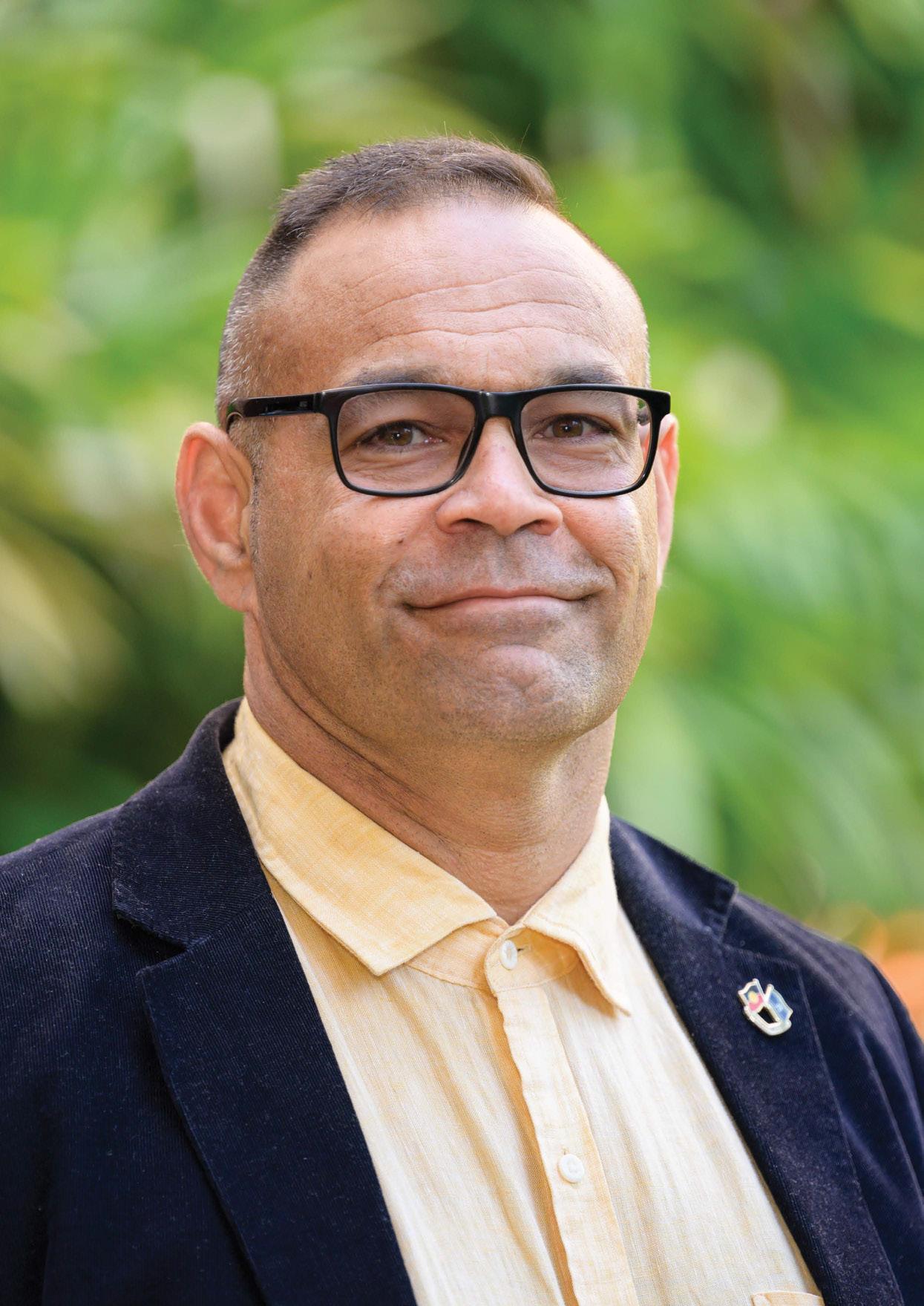
4
Introduction
Message from the Chairperson
It gives me great pleasure to open my first annual report as Chairperson of the Aboriginal Legal Service (NSW/ACT) Limited.
While I was recently elected as Chairperson in August 2023, I served as a Director throughout the reporting period. On behalf of the Board and ALS community, I extend thanks to my predecessor Mark Davies for his commitment and many contributions towards our mission.
In true ALS fashion, it was another busy year. The Board continued to focus on growing and strengthening the organisation, including governance and services to our communities.
When we look back at the work of the ALS in the last financial year, we can be immensely proud. The organisation supported more than 21,000 clients and their families, providing over 129,000 services.
We could not have delivered these services without core funding provided by both the Commonwealth Attorney-General’s Department, including through the National Legal Assistance Partnership, the NSW Government and the ACT Government. These services include several new and expanded services, enabling the ALS to offer holistic and wrap-around support for our communities in more locations.
As a key partner in Closing the Gap and in our role as justice lead for the NSW Coalition of Aboriginal Peak Organisations, the ALS is costeering important initiatives in NSW. We know that systems are failing Aboriginal people, and we know they will only be fixed when our people have a genuine seat at the table. We are proud to be building the NSW Aboriginal Justice Partnership, a collaboration between our communities and the NSW Government so that we can work together on Closing the Gap.
Exciting initiatives funded by the NSW Government under Closing the Gap include a new pilot program supporting Aboriginal children to get bail earlier and more often; an Aboriginal community ‘throughcare’ strategy, looking at how our mob can be supported with effective and culturally safe programs to stay
out of prison; and a Therapeutic Pathways for Children initiative – a plan to bring together different services to direct children away from prisons and towards healthier, more fulfilling lives. We also welcomed additional funding to keep sending ALS lawyers into children’s prisons, ensuring we can check on their welfare and legal needs face-to-face.
While we are very pleased that the Commonwealth, NSW and ACT Governments have provided funding for new discrete initiatives enabling us to provide new and expanded services, it is important to note that many of these funding contracts only last a couple of years. We know the injustices we are fighting cannot be resolved in this short time.
We need Government investment to deliver the sector strengthening work required and also to meet the demand for services and expectations of communities across NSW and the ACT, particularly for more core services in criminal, family, care and protection, and civil law. The ALS will continue to prioritise advocacy for the services our communities need and equitable funding to deliver high-quality, culturally appropriate support.
On behalf of the Board, I extend our sincere thanks to everyone who continued to make our work possible in 2022–23, including our communities, funders, partners, pro bono supporters and donors. In particular, I acknowledge the commendable work of ALS staff throughout another challenging year. Thank you for fighting hard for our communities.
Jason Allan Chair
5
Message from the CEO
This year saw the ALS continue to grow the ways in which we support our communities, moving towards a more holistic service model and continuing to put cultural safety at the forefront.
Remaining true to our vision of social justice and equity for Aboriginal and Torres Strait Islander people, families and communities, we introduced new services for people experiencing domestic and family violence in the ACT, NSW South Coast, and Hunter region; and for people at risk of having their children removed from home.
As one of Australia’s first Aboriginal communitycontrolled organisations and with over 50 years of experience in fighting for justice, no one is better placed than the ALS to deliver these services for our people in NSW and the ACT.
To enable greater focus on community partnerships and sector strengthening, this year the ALS created a new practice area Justice Projects, Policy and Practice which sits alongside our pre-existing Criminal Law Practice and Care and Protection/Family Law Practice. The introduction of this team has seen us launch a justice reinvestment program with engagement officers supporting the Mt Druitt, Bourke and Moree communities to develop tailored local justice plans.
There remains an acute need for adequate, equitable and long-term funding to meet the holistic justice needs of communities not only here in NSW and the ACT, but across Australia. In 2023, ongoing workload pressures faced by Aboriginal and Torres Strait Islander Legal Services (ATSILS) around the country reached a crisis point. Here in NSW, we were forced into a devastating decision to freeze criminal law services at 13 NSW Local Courts to protect the physical and mental health of our teams and their ability to do their best work for our clients.
We are dedicated to maintaining the high-quality legal services that Aboriginal and Torres Strait Islander people expect and deserve.
We fought for our communities’ right to these services, calling for a $250 million emergency support package to get us to the end of the National Legal Assistance Partnership (NLAP) in June 2025 and to mitigate the workload crisis faced by ATSILS across Australia.
We thank Federal Attorney-General Mark Dreyfus for responding to our requests, providing a small additional one-off funding package. However, it’s no secret that we need more to address a long-term underinvestment in legal assistance for Aboriginal and Torres Strait Islander communities.
We are currently participating in an independent review of the NLAP and advocating for a significant increase in long-term funding to meet the needs of our communities.
Amid these challenges, our supporters continue to stand by us in solidarity. This year set a new record for community donations to the ALS. We are galvanised by the strong and principled support we receive from everyday people who pitch into the fight for justice.
Enormous thanks to our dedicated ALS staff and volunteers who so frequently go beyond expectations to deliver the best service for our clients. It is the work of our many justice warriors our admin teams, field officers, solicitors, tenant advocates to name but a few that fires the ALS movement.
The impressive acumen of our teams was evidenced this year by the appointment of not one, but two senior ALS staff to the judiciary. While it was bittersweet to farewell Her Honour Judge Sarah Hopkins and Her Honour Magistrate Keisha Hopgood, we are so proud and grateful that we have benefited from their skills and knowledge. Their success, and the success of so many of our justice leaders at the ALS, proves that joining the ALS movement and fighting for justice for Aboriginal and Torres Strait Islander people is rewarding in many different ways. We thank all of our past and current justice warriors for their service.
We look forward to welcoming the next generation of justice leaders next year.
Karly Warner Chief Executive Officer
6
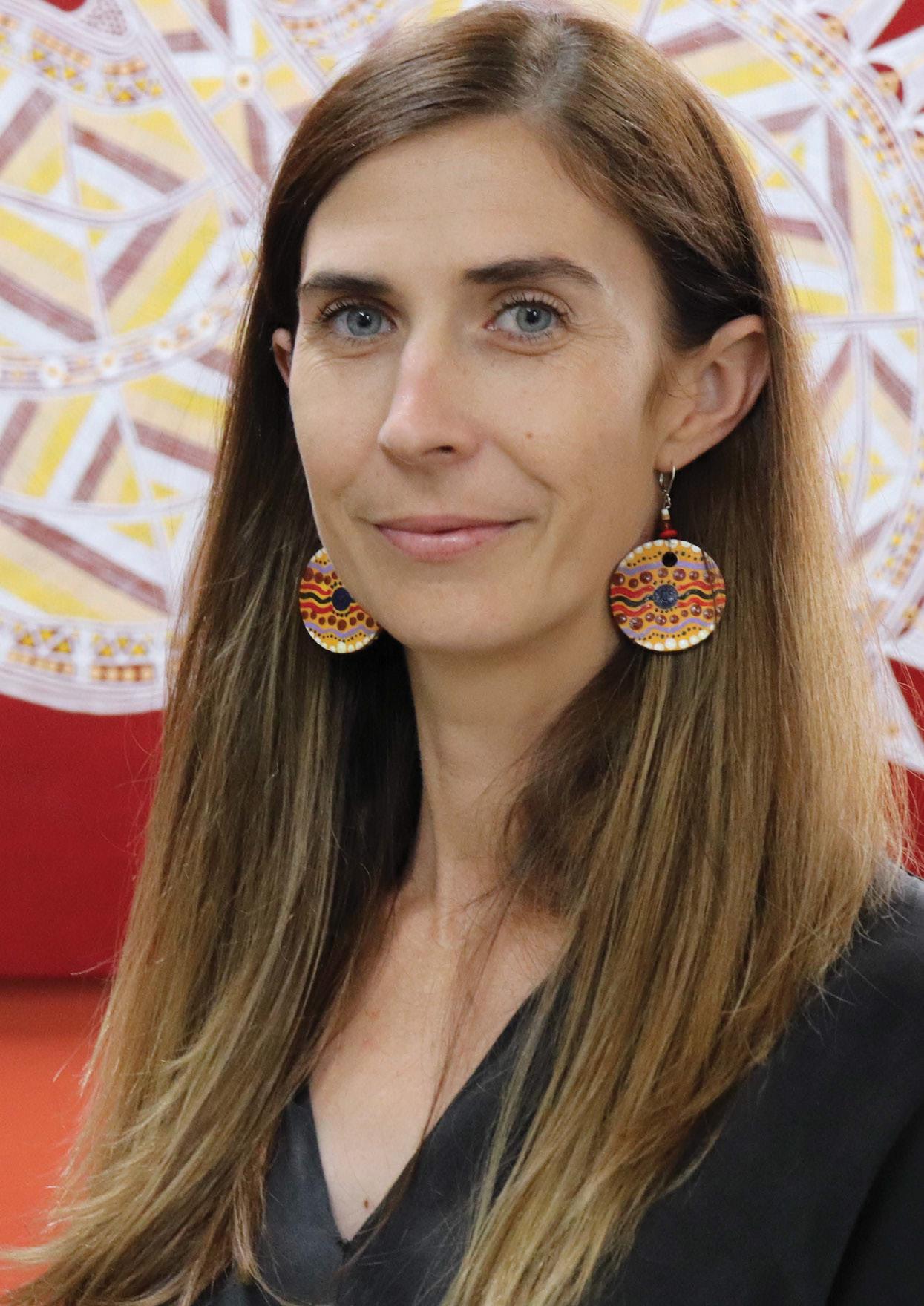
7
2022–23 at a glance
Continued operating the ALS Fines Clinic thanks to donor support, helping to resolve over 2,200 fines
Supported 37 families to seek answers into their loved ones’ deaths
Began supporting families at risk of having their children removed in the ACT
Provided regular, in-person visits to all youth prisons in NSW
Provided a lifeline for 29,563 notifications to our Custody Notification Service –a 19% increase from last year
Received record community support, with donations totalling over $3.9 million
Increased our support for people facing domestic and family violence by launching new specialist services
Ramped up community partnerships, engagement and sector strengthening with the introduction of a dedicated team
Congratulated two senior ALS staff, Sarah Hopkins and Keisha Hopgood, on being appointed to the judiciary
Led a national campaign for emergency funding for Aboriginal and Torres Strait Islander Legal Services
Commenced the auspice of National Aboriginal and Torres Strait Islander Legal Services
Opened new offices delivering specialist services in Newcastle and Nowra
8
Our legal practice impact*
21,162 clients supported
129,387 recorded services including:
140 courts attended
3,353 discrete assistance
12,800 representation services
354 services to the community
83,317 duty lawyer services
29,563 calls to the Custody Notification Service
*This data captures legal work across our Criminal Law Practice and Care & Protection/Family Law Practice in NSW and the ACT and recorded in line with the data standards manual.
It does not capture social justice programs including tenants’ advocacy and advice services, or services delivered by the Ngurrambai Bail Support and Front-Up teams in the ACT.
9
Who we are
The Aboriginal Legal Service has been fighting for justice and equity for our peoples for more than 50 years.
Born out of a protest movement, we are the primary legal service for Aboriginal people in New South Wales and the ACT. We deliver free, culturally appropriate legal advice, representation, information and referrals for thousands of people each year.
Yet we are more than a direct services provider. As a peak body and proud Aboriginal community-controlled organisation, we speak out to combat injustice, reform discriminatory laws, and demand accountability from public institutions. We are recognised nationally for our strong advocacy and law reform work.
How we make a difference
We support our mob every day by providing:
Legal services
As at June 2023, we had 275 team members working from 26 offices in 21 locations
Advocacy and law reform to speak up for our people and provide expert advice to change the system.
Advocacy and law reform
Community services
Legal services in criminal defence, children’s care and protection, family law, and civil law.
Community services including justice support programs and tenants’ rights services.
10
Governance and strategy
Strategy
Our vision
Social justice and equity for Aboriginal and Torres Strait Islander people, families and communities.
Our mission
To deliver quality and culturally appropriate legal services that meet the needs of Aboriginal and Torres Strait Islander people throughout NSW and the ACT and to be recognised as the leader in this field across Australia.
Our values
• We are proudly Aboriginal
• We are community focused
• We are fearless in our advocacy
• We are accountable
• We make a difference to create better futures
• We acknowledge and respect land, traditional values and cultural practices
Our 5 focus areas and goals
Focus Goal
1Connecting and collaborating with our communities
2 Telling our story
3Delivering high quality, culturally safe legal and support services
4Advocating for justice and achieving community-led change
5Laying strong future foundations
We are seen by community as the legal provider of choice, part of a strong and visible network of Aboriginal peak bodies working to holistically support our people
We’re celebrated as the first ALS and first free legal service in the country and clearly communicate the availability, value and impact of all our services
We have a culturally safe, professional and committed workforce who feel valued and uphold the ALS legacy, delivering sustainable impact with and for our communities
Community recognise the ALS as a fighter for our people and know we have their backs in the fight for justice. Together, we transform the justice system
Through diversified and sustainable income streams, innovation and a pipeline of talent, ALS services keep people strong in community and culture
View the ALS Strategic Plan 2021–2026 online: www.alsnswact.org.au/strategy

11
Governance
The ALS is a public company limited by guarantee, governed by an Aboriginal board. We are a registered charity with the Australian Charities and Not-forprofits Commission and a tax-deductible gift recipient.
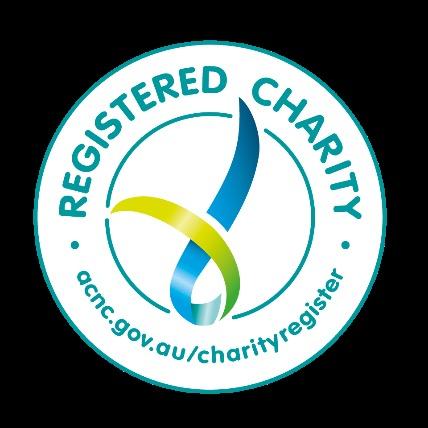
Ever since our founding in 1970, community control has been at the heart of the ALS. We were one of the first Aboriginal communitycontrolled organisations in Australia and are proud to be owned, governed and led by the communities we serve.
Our membership consists of up to 30 Aboriginal people from NSW and the ACT. This includes 10 from each of three regions: Northern, Western, and Central South Eastern. Company members are elected by their communities for three-year terms. In turn, the members for each region appoint up to four people among their ranks to become directors and form the ALS Board. In addition to the directors elected from each region, up to two honorary directors are permitted under the ALS Constitution to be appointed to the Board.
Strengthening governance
A project is underway to refresh the ALS Constitution and improve our governance in support of the current and future work of the organisation. This work is informed by an independent governance review completed in 2021.
Progress towards this goal included the formation of a Constitutional Committee; the facilitation of a constitutional reform workshop for ALS members; and the appointment of Gilbert + Tobin to prepare a draft constitution, informed by member feedback. A step plan for constitutional reform has been developed and progress will continue during the 2023–24 financial year.
Board movements
Tony McAvoy SC was elected as a director for the Central South Eastern Region early in the financial year.
12
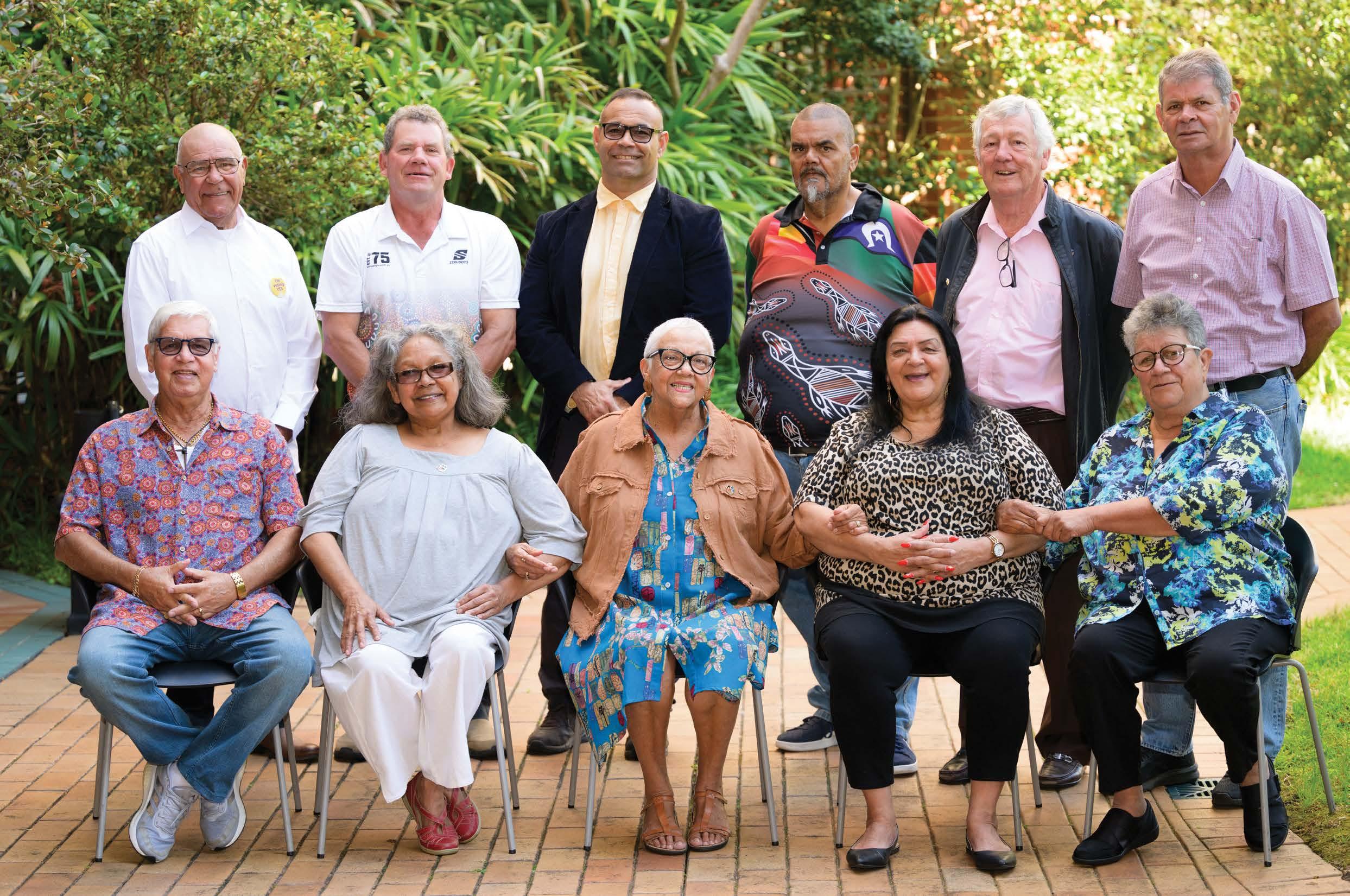
The ALS Board in 2022–23
Helen
Antionette House
Raymond
Tony
Hewitt Whyman
13 Name Role Region
Davies Chair (resigned as Chair and Director 14 July 2023)Northern
Mark
Deputy Chair Western
Lorraine Wright
Director
25
2023) Northern
Jason Allan
(elected Chair
August
Director Northern
Avery Brown
Director Northern
Brown OAM
Western
Robert Carroll Director
Director Central South Eastern
Cindy Fuller
Director Central South Eastern
Western
Keed Director
Director
Central South Eastern
McAvoy SC
(elected 21 July 2022)
Director Central South Eastern
Keith Morgan
Director Western
Peter Stapleton Honorary Director
The ALS Board pictured in September 2023. Standing, L to R: Uncle Hewitt Whyman, Keith Morgan, Jason Allan, Raymond Keed, Peter Stapleton, Robert Carroll. Seated, L to R: Avery Brown, Cindy Fuller, Aunty Helen Brown OAM, Antionette House, Aunty Lorraine Wright. Not pictured: Tony McAvoy SC, Mark Davies.
Connecting and collaborating with our communities
Community legal education
We support our communities to know their rights, and how to pursue justice and minimise harm within the legal system.
In 2022–23 we delivered community legal education (CLE) on multiple topics in various locations across NSW and the ACT. We provided CLE at events such as Mounty Yarns’ “Listen to Change” in Mt Druitt and the Moree Legal Expo, and in visits to community groups such as Ulladulla Elders Group and the Batemans Bay Elders Community Meeting.
Our new Family Violence Prevention Unit in the ACT delivered a five-part education series at the Jerrabomberra Wetlands Women’s Group. The participants in this group are victim/survivors of domestic and family violence, and many have experience dealing with the child protection system. The CLE series covered topics on family violence orders, Child and Youth Protection Services in the ACT, and family law. We received positive feedback from the community and were able to strengthen our relationships with stakeholders.
The Family Violence Prevention Unit on the NSW South Coast also went on a CLE blitz, delivering tailored sessions based on community needs. This included a visit to a local high school, where an ALS staff member discussed issues such as online safety and identifying unsafe behaviours with young Aboriginal students; and a session on early intervention family law for the Eden Women’s Group.
Our ACT Criminal Law Practice meanwhile provided CLE on the rights and obligations held by respondents to apprehended violence orders (AVOs).
Alongside delivering CLE directly to community members, we provided sector training to share our knowledge with other community workers. In Nowra, our strong partnership with local
organisation Waminda meant that we were able to deliver a number of sessions to their staff on topics such as “Right of Appearance vs Right to Be Heard in the Children’s Court of NSW” and “section 76 and section 82 reports”. We were also invited to co-deliver internal child protection training to Waminda staff, which was a great opportunity to strengthen referral pathways.
We also presented information about dealing with COVID fines at the Legal Aid Civil Law Conference in September 2022, and provided training on the same topic for members of Dharriwaa Elders Group in Walgett.
Finally, we were pleased to have some opportunities to present to law students this year, promoting the ALS and furthering knowledge of the legal system’s impact on our communities. In April 2023, an ALS solicitor gave an online guest lecture at the Hague University on the youth justice system in Australia; and in June 2023, we hosted Aboriginal law students at the ALS Redfern office to discuss careers in criminal law and promote the ALS as an employer of choice for Indigenous lawyers.
14
CLE highlight: new flyers to promote our services
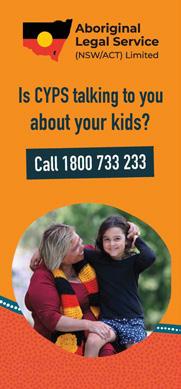
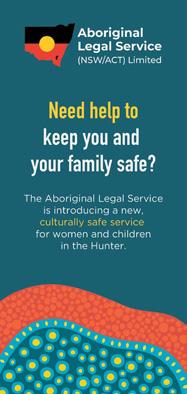
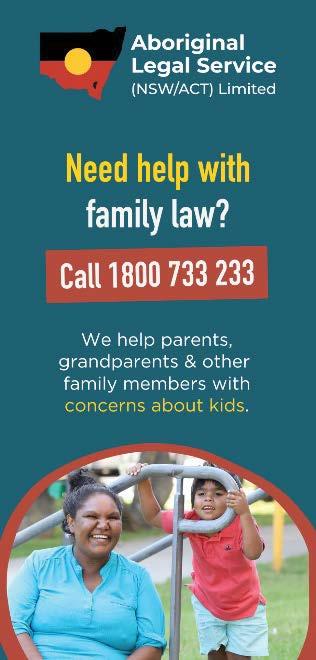
In June 2023, we published a new range of eight flyers to promote up-to-date information about the growing range of services offered by the ALS. The new flyers are designed to be basic and eye-catching, providing short and accessible information about how we can help and how to avoid legal trouble.
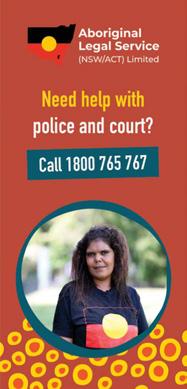
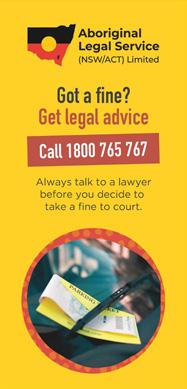
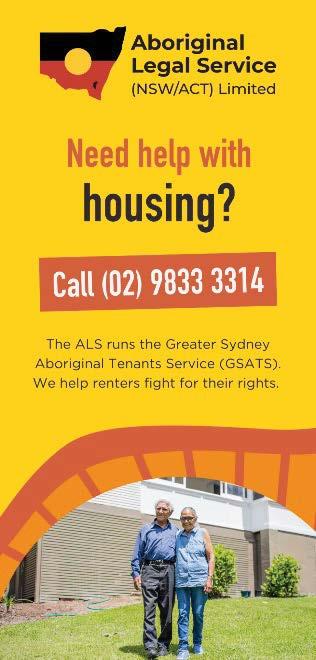
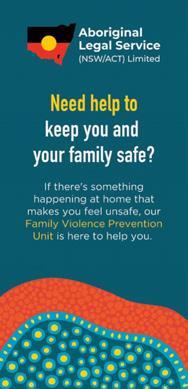
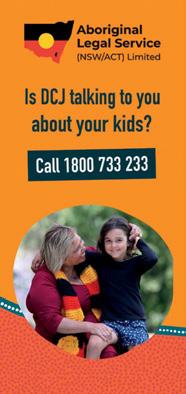
15
Justice reinvestment
The aim of justice reinvestment is to redirect funding away from prisons and into communities that have high rates of contact with the criminal legal system. It is built on recognition that communities are strengthened by support for local services and infrastructure, not by incarceration.
This is a way of working that is led by the community, informed by data, and builds strategies to address issues at a local level by identifying and tackling a range of drivers contributing to contact with the justice system and incarceration, including through reform of government policies and systems.
Since finalising our auspice of Just Reinvest NSW and Maranguka in 2022, the ALS has built our own justice reinvestment team which continues to work collaboratively with these two (now independent) organisations and local communities.
We continue to work closely with the NSW Government and Just Reinvest to establish a Justice Reinvestment Partnership Group tasked with expanding the justice reinvestment approach across NSW.
NSW Coalition of Aboriginal Peak Organisations
We are proud to be a member of the NSW Coalition of Aboriginal Peak Organisations (NSW CAPO).
NSW CAPO is working in formal partnership with the NSW Government on Closing the Gap at a state level (see page 38 for more on this). In accordance with Priority Reform 1 strengthening local partnerships and developing shared decision-making we are working to elevate the voices of community, ensuring they can actively participate in the Closing the Gap process.
In 2022–23, we participated in over 30 engagements with Aboriginal communities alongside NSW CAPO colleagues, where we shared information on the new initiatives in the NSW Closing the Gap Implementation Plan and promoted opportunities for local involvement.
Organisations forming the NSW Coalition of Aboriginal Peak Organisations.
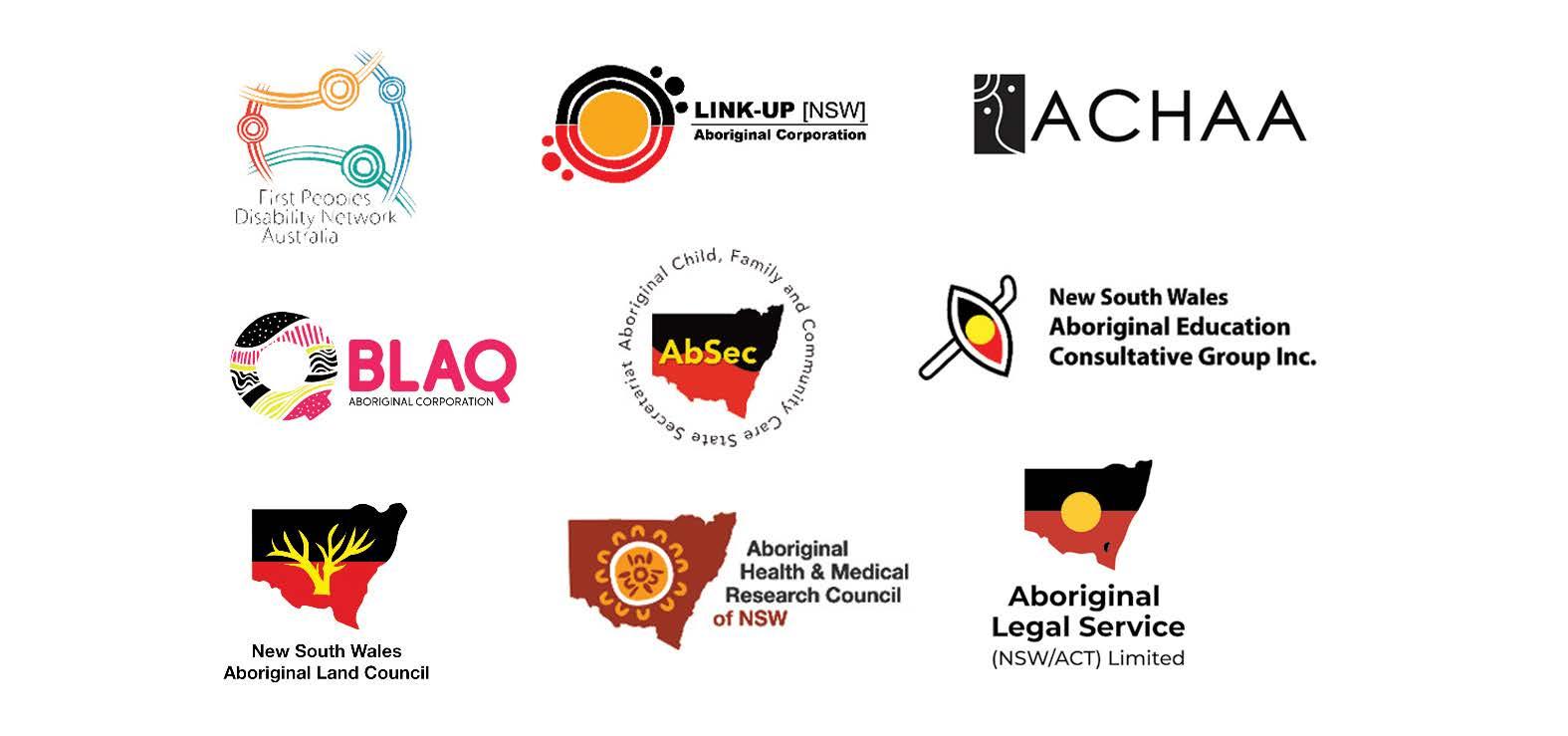
16

Community engagement
This year we were able to ramp up our presence at community events, thanks to the establishment of a community partnerships and programs team within the ALS which includes a dedicated Senior Community Engagement Officer.
We attended events including the Koori Knockout in Tuggerah, Yabun Festival, Mounty Yarns’ “Listen to Change” event in Mt Druitt, NAIDOC in the City, Deadly Connections’ “Deadly Nights” celebration during Youth Week, AbSec’s Family Fun Day, and the inaugural Warangesda Festival in the Murrumbidgee. The ALS hosted NAIDOC Week events in Coffs Harbour, Batemans Bay, Canberra, Dubbo, Wollongong and Sydney.
These events are an important way for us to link in with community and provide information and referrals for our services.
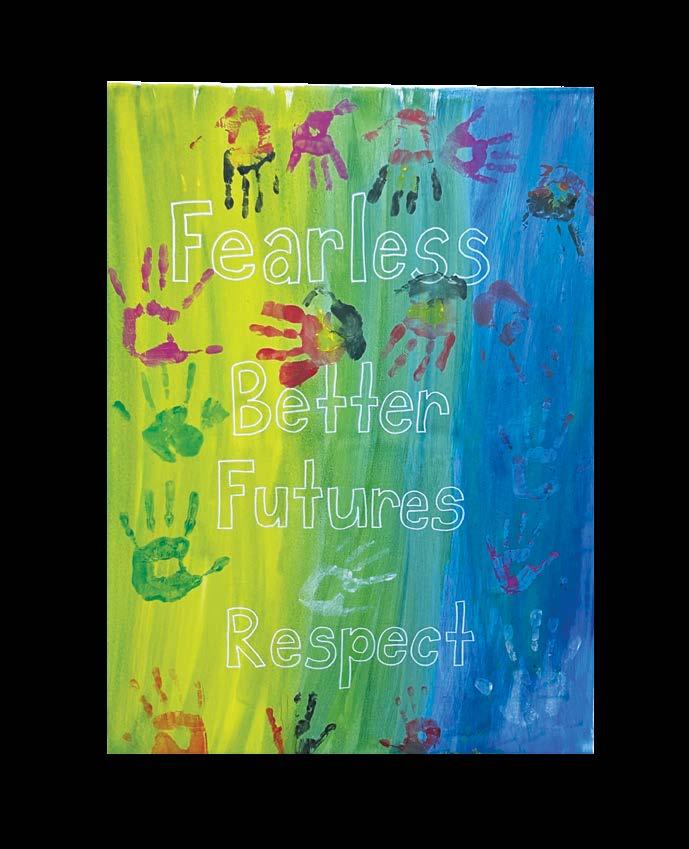
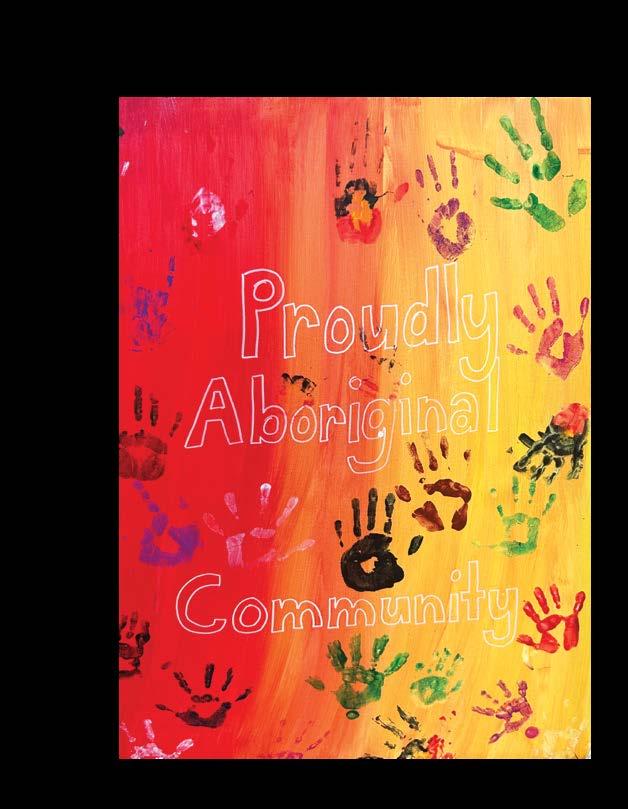
Community engagement highlight
ALS staff members connected with the Mt Druitt Aboriginal community at Mounty Yarns’ “Listen to Change” event in March 2023.
This free community event was led by local young people and showcased the ideas, talents and solutions of Aboriginal youth with lived experience of the criminal justice system.
We provided community with opportunities to discuss their police matters, complete referrals for our Fines Clinic, and meet ALS staff in a casual environment rather than in a stressful, legal context.
Our stall offered brochures with information about our various support services, as well as ALS merchandise. At our stall, we also invited community members to add their handprints to canvases decorated with words reflecting our ALS values.
17
ALS staff at the Listen to Change event in Mt Druitt.
Refreshing our logo
We rolled out a refresh to the ALS logo in 2023, retiring our previous 50th anniversary logo. The new logo is similar to what came before but spells out the full words ‘Aboriginal Legal Service’ as opposed to ‘ALS’. This change is designed to make us and our purpose more apparent to people who may not be familiar with the acronym. This places the organisation in a strong position to be known and recognised as we continue to grow our services.

Our public profile and advocacy
The ALS speaks out regularly to bring exposure to important issues and agitate for change.
Through our website, social media channels, and the news media, we platform the legal and social justice matters that are important to our communities and how the ALS can offer support.
This year the ALS appeared in several major print media outlets and broadcast channels, commenting on a wide range of issues including deficient healthcare in prisons, police strip-searches of children, COVID fines, and the ongoing disparity in Aboriginal children removed from their families into out-of-home care.
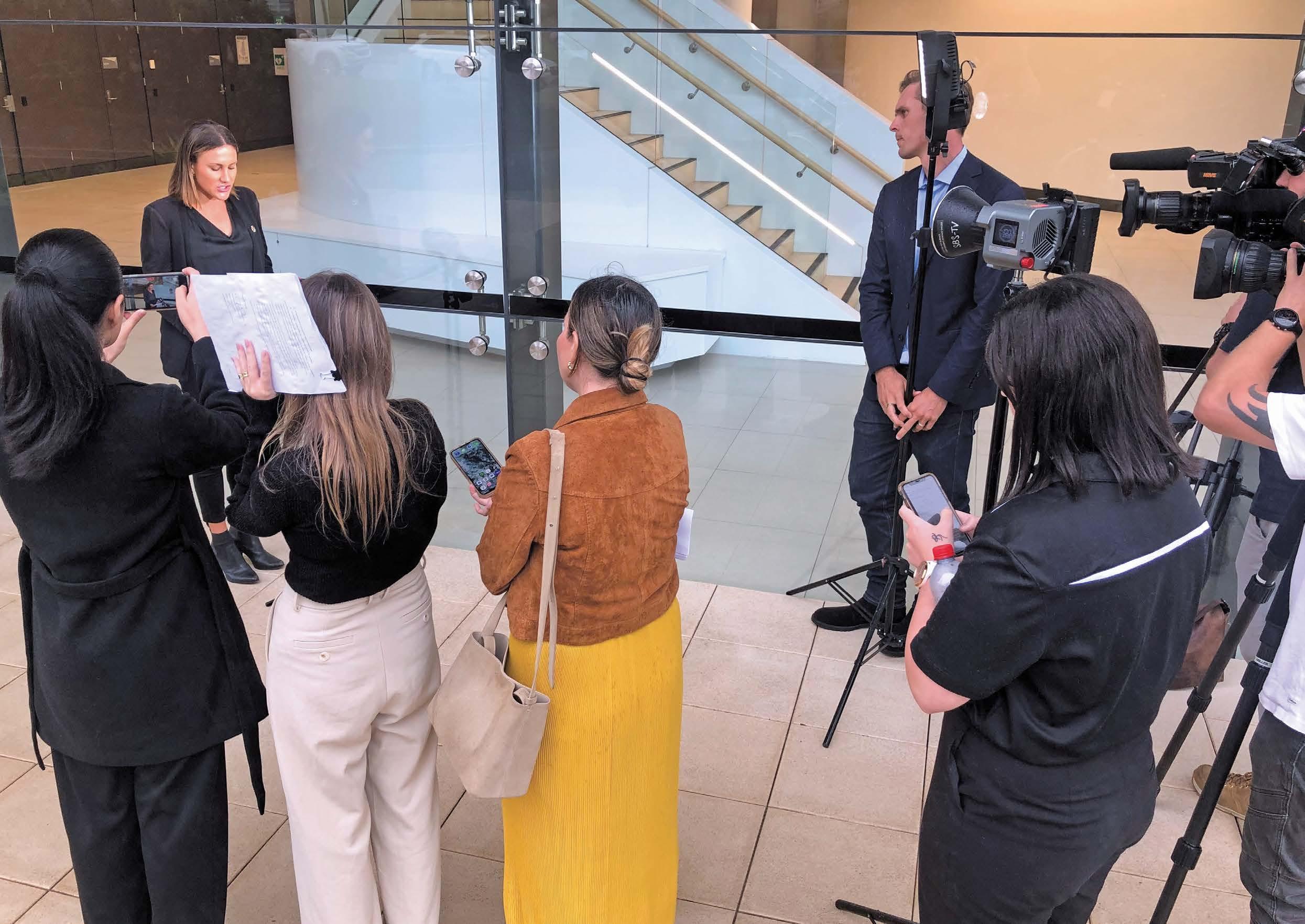
18 Telling our story
Media highlight: campaigning for critical funding for our services
This year marked a point of no return in the long-term challenges the ALS faces due to inadequate government funding of our services.
On behalf of Aboriginal and Torres Strait Islander Legal Services (ATSILS) across the country, we spearheaded an advocacy campaign calling for emergency funding to prevent imminent freezes to frontline services.
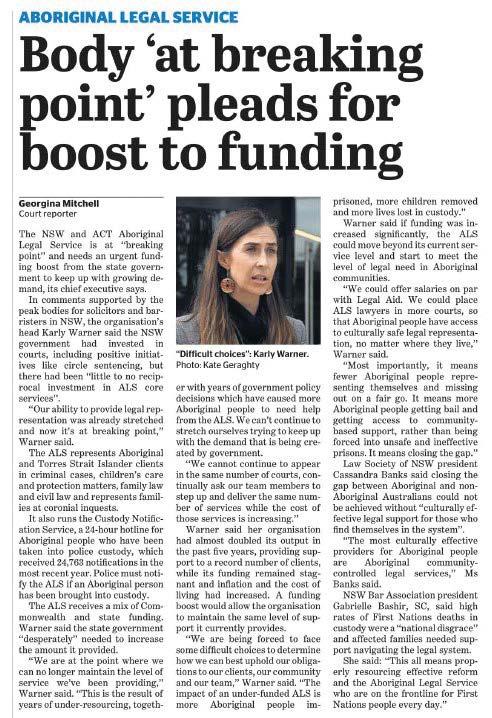
Further information about the funding crisis and this advocacy campaign can be found on page 46.
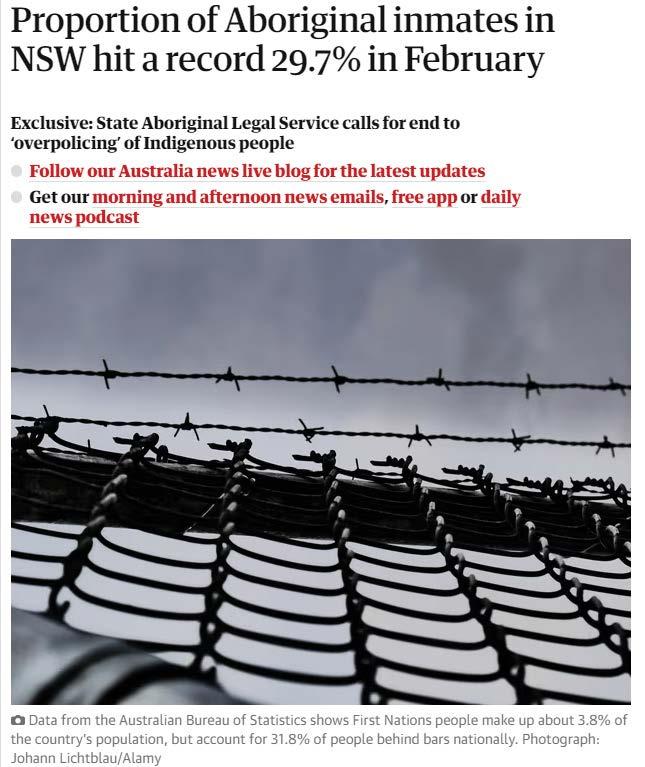

19
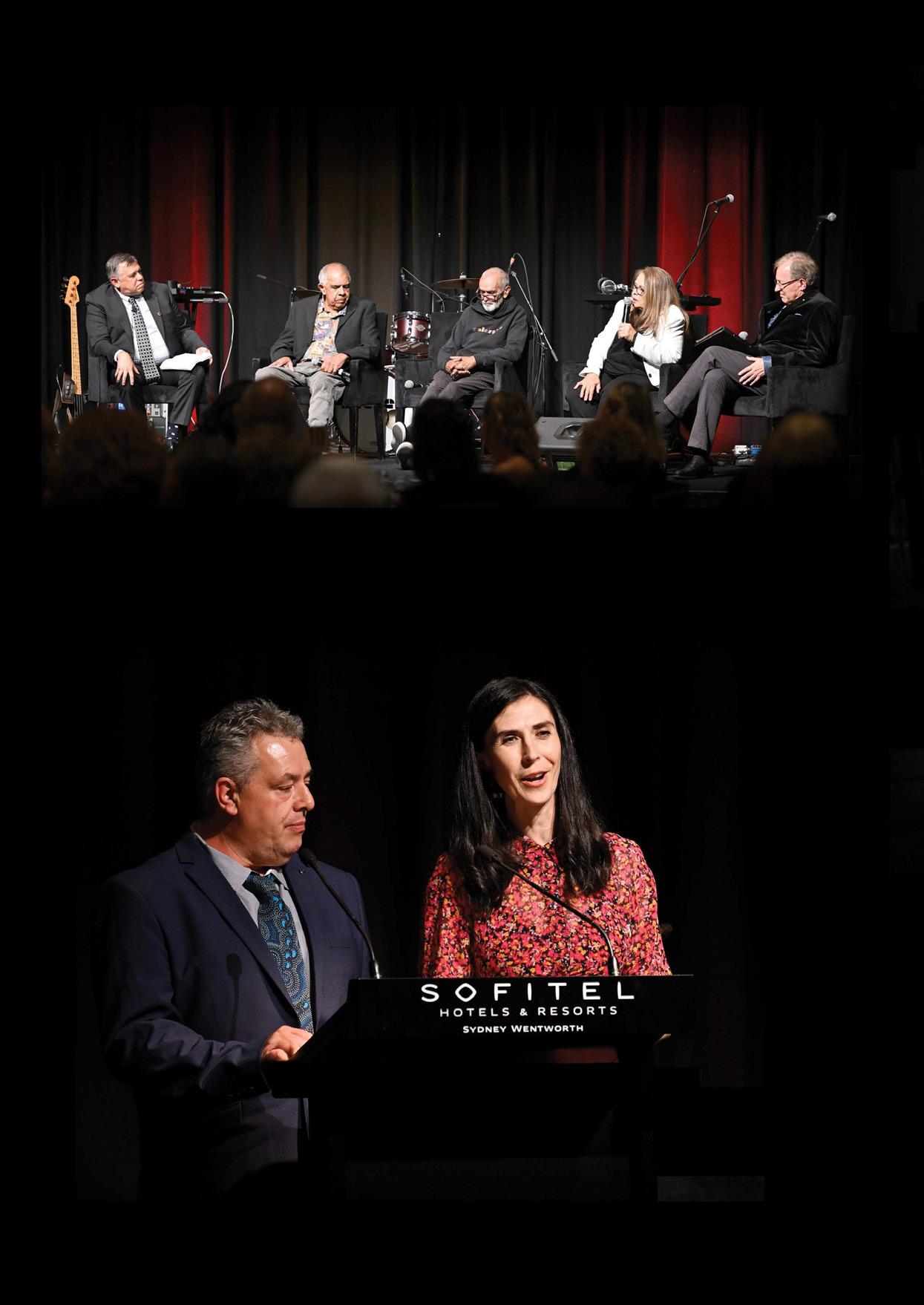
20
Tony McAvoy SC, Uncle Gary Williams, Prof Gary Foley, Aunty Ann Weldon, and Alan Cameron AO discuss the ALS’ legacy.
Mark Davies (ALS Chairperson 2020-2023) and Karly Warner (CEO) address the gala dinner guests.

50th anniversary gala dinner
We concluded ALS 50th anniversary celebrations in November 2022 with a gala dinner at the Sofitel Sydney Wentworth. This main event had been a long time in the making, with many anniversary initiatives delayed by COVID.
It was an honour to celebrate our legacy of resistance, resilience and solidarity with our founders and Elders, community, the legal fraternity, staff and supporters. The gala dinner was attended by more than 400 people.
The evening was hosted by Aboriginal actor Elaine Crombie. It featured presentations including a panel discussion with ALS cofounders Professor Gary Foley, Aunty Ann Weldon, Uncle Gary Williams, and Alan Cameron AO, moderated by Tony McAvoy SC; addresses from Minister for Indigenous Australians, Linda Burney MP, and then NSW Attorney General, Mark Speakman SC MP; entertainment from Burrundi Theatre and Pirra; and of course, a few words from our CEO, Karly Warner and Chair, Mark Davies.
Guests also enjoyed a restaging of our 50th anniversary photo exhibition and a fundraiser silent auction.
Our sincere thanks go out to the event’s sponsors: the NSW Department of Communities and Justice; City of Sydney; Commonwealth Attorney-General's Department; Ashurst; and Gilbert+Tobin; as well as everyone who donated items and experiences to the silent auction.
View photos from the big night on the ALS website:
www.alsnswact.org.au/als_gala_event

21
The evening wrapped up with a stellar performance from indie-pop band Pirra.
Stories of 2022–23
The following pages contain a small sample of stories of how the ALS has changed lives and fought for our communities this year.
*Some names have been changed to protect the privacy of our clients.
Criminal law
In early 2023 we defended Shayleen Frail against charges for which she was found not guilty.
Shayleen became well known back in 2021 through the most unimaginable of circumstances, when she and her sons were hit by a car while walking on a footpath. Tragically, her two young boys passed away, while Shayleen was left seriously injured.
The ALS represented Shayleen in a recent judge-alone trial for unrelated matters.
“Shay was found not guilty of all charges after being extremely brave and giving evidence,” said ALS Solicitor, Harriet Skinner.
“The fact that she was found not guilty and able to put this behind her so that she could return to Wellington, visit her sons’ graves and be with her family was a huge thing.”
Find out more about our criminal law work on pages 26–28.
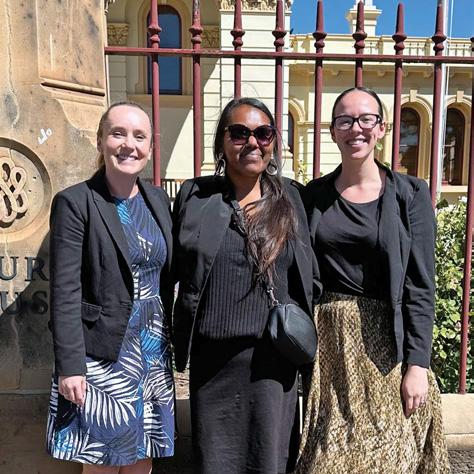
Child protection
Brent’s* children were removed from home while he was in prison. Upon his release, he agreed the kids should be returned to the care of their mother (who is non-Aboriginal), but he sought regular contact with them.
An initial proposal from the Department of Communities and Justice had Brent seeing his children just six times per year, with each visit supervised by an agency. We supported Brent to get a better deal for both him and his kids, pressing the department to allow more visits and to assess Brent’s mum (the children’s paternal grandmother) as a potential supervisor for those visits.
The grandmother was approved as a supervisor and an order was made allowing a minimum of 12 visits a year plus special occasions. Brent is currently seeing his kids weekly at his mum’s home.
This great outcome is supporting the children to build stronger connections with their paternal family, and with their Aboriginal community and culture.
Find out more about our child protection and family law work on pages 29–31.
22
Shayleen (centre) with ALS solicitors
Family violence and safety
Willow* is a young mother of three children. She was subjected to domestic and family violence and aggravated sexual assaults by her former partner and another person.
Willow was unable to leave the family home and felt that her life was at risk. Eventually she was able to flee with the children while the perpetrator was out, but she was unable to take any belongings with her.
The new ALS Family Violence Prevention Unit helped Willow navigate this extremely vulnerable situation. Firstly, we assisted her with an application for an Apprehended Domestic Violence Order (ADVO), and while the details of the sexual assaults were very difficult for her to report to the police, she was supported through the process by our caseworker. An ADVO was granted for a period of 10 years.
We then made submissions to Victims Support, and the application was assessed urgently. This too had a successful outcome, with Willow being awarded $15,000 in compensation.
Finally, we helped Willow to make an application for housing for herself and her kids.
Willow was grateful that all of her family’s needs could be addressed by one service and that she could restart her life with her children. “I can't thank you enough, you are simply amazing. Thanks heaps for helping me and my babies,” she wrote to the ALS team member who coordinated her support.
Read more about our family violence and safety work on pages 32–33.
Tenants’ advice and advocacy
Alanna’s* home was riddled with mould, caused by blockages in the sewerage and storm water drains. She had taken weekly photos of the mould problem both before and after cleaning but DCJ Housing wouldn’t act.
Alanna was particularly concerned about the potential health ramifications because she had young children and was pregnant with another on the way. She tried to get the issue fixed by reporting it to the housing maintenance line, but infuriatingly, she was told she was not the tenant at the property, despite having lived there for six months.
A friend gave Alanna the number for the Greater Sydney Aboriginal Tenants Service (GSATS) and she called us for help. Once we contacted DCJ Housing on her behalf, she was accepted as the tenant and able to lodge a repair request. Yet Housing failed to follow up on the request and Alanna and her kids were still left to live amongst the mould.
Finally, we took the matter to the NSW Civil and Administrative Tribunal on Alanna’s behalf. The tribunal ruled in her favour, awarding her over $8,000 in compensation and ordering Housing to begin work on the repairs.
Read more about our tenants’ advice and advocacy services on page 37.
23
CASE STUDIES
CASE STUDY
Deaths in custody and police operations
Gomeroi man Gordon Copeland was 22 when he drowned in the Gwydir River while running from police. His family remember him as a kind and loving young man with a big heart. He was a son, father, partner, brother, nephew and friend. Tragically, his partner was heavily pregnant with their second child at the time of his death.
It took almost three months for police and rescue services to locate Gordon’s body, just 500 metres away from where he had last been sighted in the river. During that time, his family searched for him every single day.
In a first for the ALS, we represented both Gordon’s partner, Josephine Brown, and his mother, Narelle Copeland in the July 2022 coronial inquest into his death; appointing two solicitors, one coronial advocate, two coronial support officers, and an external barrister to work as separate teams for each client.
We had first come to the assistance of the family some time beforehand, when we helped advocate for them behind-the-scenes during the agonising months when Gordon was still missing and his family were pleading for more resources to be put towards the search.
The subsequent inquest heard several distressing details, painting a picture of both individual and systemic failures by Moree police from the initial search of the river which lasted just 10 minutes and was punctuated by derogatory and joking comments about Gordon, to the dismissive and disrespectful treatment of his family when they reported him missing.
The Coroner found that mistakes were made at several points, including “critical” mistakes when Gordon was still alive and fighting for his life in the river.
“Police were too focused on the idea of catching someone who had fled from police, rather than doing a risk analysis to work out whether that person was in danger,” Her Honour wrote.
The Coroner made six recommendations to the NSW Police Force, focused on improving cultural training, trauma-informed communication, critical thinking, rescue resources, and debriefing processes.
“Most people at court today get to move on from this, but we don’t. Our family and community are forever changed because of the police actions that night,” said Gordon’s aunty, Lesley Fernando, at the conclusion of the inquest.
Read more about our work in coronial inquests on pages 42–43.
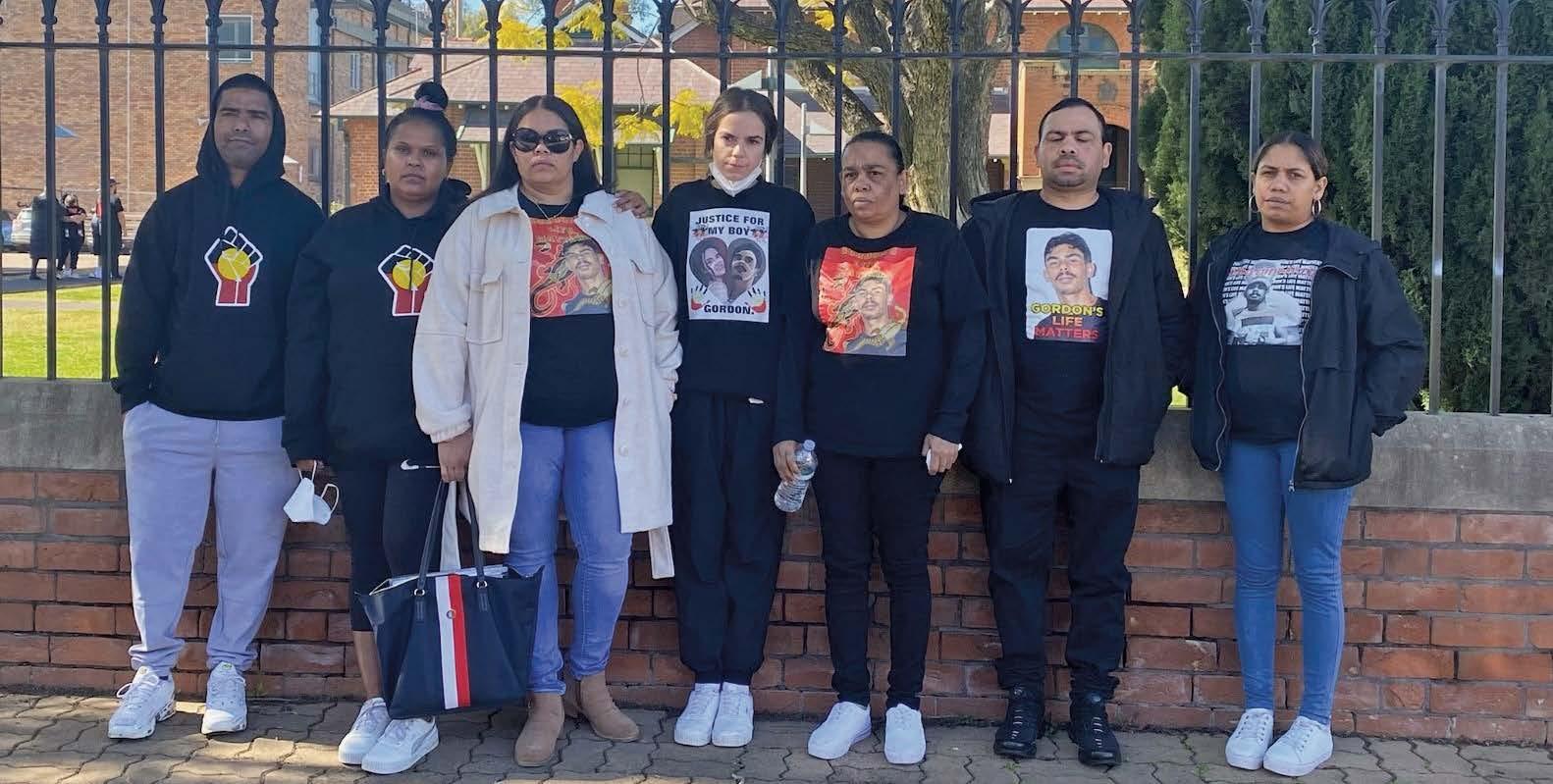
24
Gordon’s family stand outside Moree Courthouse during the July 2022 inquest.
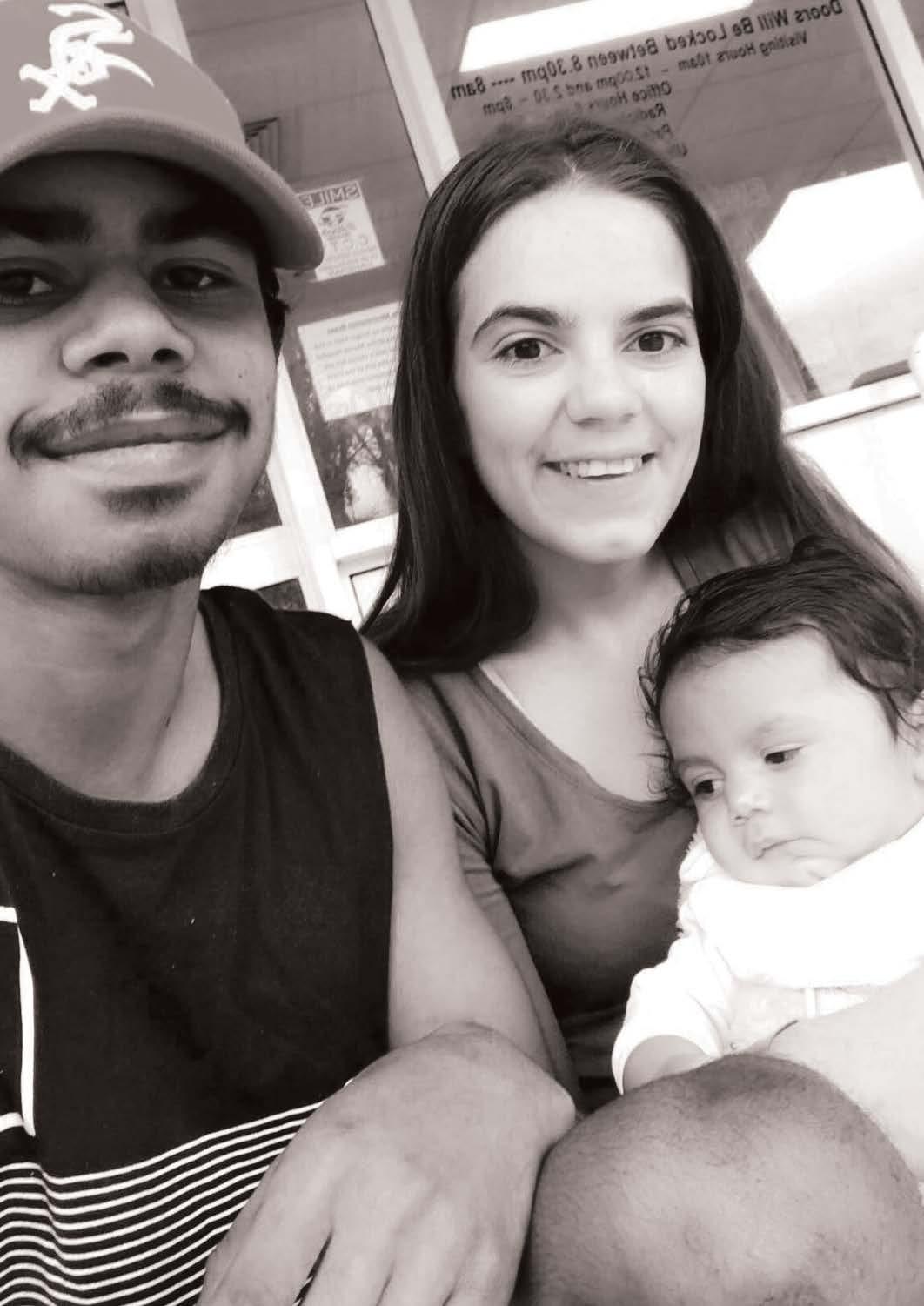
25
Gordon and partner Josephine with their first son.
Delivering high quality, culturally safe legal and support services
Criminal law
Our Criminal Law Practices in NSW and the ACT defend the rights of Aboriginal people and aim to minimise their contact with the legal system.
19,600+ clients supported
Local Court service freeze
From 15 May 2023, the ALS was forced to make the difficult decision to freeze criminal law services at 13 Local Courts across NSW.
This was the result of the ongoing workload crisis that has seen demand for our services increase dramatically over the past five years while core Commonwealth funding has declined in real terms. This unsustainable workload risks the physical and mental health of our staff and therefore our clients.
We joined with other Aboriginal and Torres Strait Islander Legal Services across the country to advocate for equitable and sustainable funding. While this resulted in a small funding boost from the Commonwealth Government, it was unfortunately not enough to mitigate the need to freeze services. Further information about our advocacy campaign can be found on page 46.
Prior to implementing the service freeze, we consulted and collaborated with several bodies including the courts and Legal Aid NSW to ensure the smallest possible impact on our clients and communities. We were proactive in informing affected clients of the service freeze and facilitating their ongoing legal support
97,073 recorded services
through Legal Aid or alternative providers. We opted to retain a small number of matters where clients were particularly vulnerable, we had already acted in the matter for a prolonged period, or the matter was otherwise particularly complex.
Local Courts where ALS criminal law services have been frozen:
• Byron Bay
• Eden
• Forster
• Junee
• Lithgow
• Moss Vale
• Muswellbrook
• Scone
• Singleton
• Temora
• Tenterfield
• West Wyalong
• Wauchope
26
Increasing demand for Custody Notification Service
Police in NSW and the ACT are required by law to contact the ALS Custody Notification Service (CNS) whenever an Aboriginal person is taken into custody.
A result of recommendations from the Royal Commission into Aboriginal Deaths in Custody, the CNS is a lifeline connecting people with legal and wellbeing support at one of the most distressing moments of their lives.
We received 29,563 notifications in 2022–23, an increase of 19% from the previous year. This corresponds with public data showing the number of Aboriginal adults and children in custody is increasing (NSW Bureau of Crime Statistics and Research, March 2023).
Helping children to access bail
This year we ran a number of strategic cases in the NSW Supreme Court seeking to decrease barriers to bail for young people.
As a matter of organisational policy, Youth Justice NSW does not provide bail supervision to young people pleading not guilty to their charges. This means our solicitors are unable to propose Youth Justice supervision as a bail condition for many of our young clients, making it harder to form strong bail applications and keep them out of custody. This especially disadvantages young people pleading not guilty due to doli incapax, the common law presumption that a child aged 10–13 is unable to form criminal intent.
We acted in the matters R v JH [2023] NSWSC 93; R v JH [2023] NSWSC 94; R v WB [2023] NSWSC 591; and R v GW [2023] NSWSC 664, developing a work-around approach to this problem by advancing the concept of bail ‘support’ as opposed to supervision. This opened the way for holistic case plans to be put together with general oversight by Youth Justice, which can then be put forward to the magistrate as a condition justifying release on bail.
The acceptance of this concept has significantly expanded the scope for bail conditions to be put forward and tailored for young people, giving them greater access to support and importantly, a better chance of avoiding custody even if pleading not guilty.
In 2023 we also launched the Bail Advocacy Program, a separate initiative with similar aims. Funded under the national Closing the Gap program and building on the ALS’ significant pre-existing work in this area, this program aims to help Aboriginal young people get bail and avoid short-term remand by advocating directly to police before they have made a bail determination.
The team comprises a senior solicitor based in Redfern, two intermediate solicitors in Wagga Wagga and Parramatta, plus youth officer roles and paid support people based at Mascot Police Station. One of these Mascot-based support roles helped deliver the program’s first successful outcome before the pilot was even officially off the ground, avoiding the arrest of a 15-year-old boy.
27
Circle sentencing in the ACT
Our ACT Criminal Law Practice is pleased to support many clients to have their matters heard in the Galambany Court, a circle sentencing pathway for eligible Aboriginal and Torres Strait Islander people pleading guilty to certain offences.
This process involves Elders in the sentencing process and has been found to deliver better outcomes for defendants and communities than mainstream courts.
At the beginning of the reporting period, the Galambany Court was sitting approximately one day per fortnight. In February 2023, this schedule was increased and the Galambany Bail Court was introduced; now the Court sits three days per week for both sentencing and bail hearings. This change is of enormous benefit for our clients and Aboriginal communities.
While the Galambany Court operates in the ACT Magistrates Court, as of March 2023, the ALS is involved in a steering committee to introduce circle sentencing in the ACT Supreme Court. We look forward to seeing the committee’s work come to fruition through the availability of alternative, diversionary pathways for Aboriginal defendants appearing before the Supreme Court.
Visiting Legal Service
Our Visiting Legal Service provides face-toface legal support in youth detention centres.
After beginning last financial year, this year the initiative graduated into a structured program with specialist Children’s Court lawyers visiting all six juvenile detention centres across NSW in-person.
We provide advice and access to further assistance for a wide range of issues including civil law matters, plus complaints about treatment in detention or police custody. The model is the first of its kind in providing regular, coordinated, face-to-face visits for children in detention.
Supporting people to stay out of prison in the ACT
Through the ACT-based Ngurrambai Bail Support program, we help Aboriginal people to apply for bail and meet their bail conditions. We also provide the Front-Up program, supporting people with outstanding warrants or bail breaches to face court.
These culturally safe services are helping Aboriginal people to avoid imprisonment in the ACT.
In 2022–23, we helped 41 clients through Front-Up plus a record 271 clients through Bail Support. Of these clients, 229 received bail, equating to a success rate of 85%.
We have received increased referrals for Bail Support from Legal Aid Canberra and private law firms, while our ongoing and active outreach efforts have also resulted in further interest in the program.
The collaborative, cooperative spirit of these two programs is key to their success. Our Bail Support team works productively with Community Corrections to get in contact with difficult-to-reach clients, helping them avoid breaches of bail conditions and assisting them to attend mandatory appointments. Monthly meetings with ACT Policing have proved valuable in gaining their genuine support for the Bail Support and Front-Up programs, including anecdotal evidence from our clients that police are avoiding arresting people who commit to ‘front-up’ to the ALS within two days to address their outstanding warrants or bail breaches.
The ACT Chief Magistrate has publicly recognised the Bail Support program and suggested that bail decisions be granted in favour of the client when program staff are present in court. This recognition has been echoed by other magistrates who have called upon program staff during proceedings to assist in their respective decisions to grant bail.
28
Child protection and family law
Our Care and Protection/Family Law Practice supports people to keep themselves and their children safe while resolving family relationship matters.
1,357 clients supported
NSW Care and Protection Practice
The ALS aims to be a legal provider of choice for Aboriginal and Torres Strait Islander families involved in the NSW child protection system.
With offices located in metropolitan Sydney and Wollongong, Lismore and Newcastle, we also service regional Children’s Court circuit lists across the state including the Illawarra, Hunter, Northern Rivers, Mid North Coast and Western Children’s Court circuits.
A tailored Children’s Court process in Dubbo
Throughout 2022–23, we continued to be involved as a key stakeholder in consultations with Dubbo community members, the Children’s Court NSW, Department of Communities and Justice (DCJ), and Legal Aid NSW in the co-design and establishment of a first Indigenous List under the Children and Young Persons (Care & Protection) Act 1998.
The model is a shift away from traditional Children’s Court processes and procedures towards a more culturally appropriate and family-oriented approach in a less formal courtroom setting. The List promises to explore Aboriginal and Torres Strait Islander cultural considerations; involve parents, children, and sometimes extended family members in proceedings; and help families to connect to
2,123 recorded services
local community support services. It will also provide an Aboriginal Court Liaison Officer to support families involved with the court, similar to the Indigenous Family Liaison Officer role working on the Specialist Indigenous List in the Federal Circuit and Family Court.
We are proud to have helped bring this key reform to life in response to Recommendation 125 of the Family is Culture Review Report. The Winha-nga-nha List was rolled out just beyond the reporting period in September 2023.
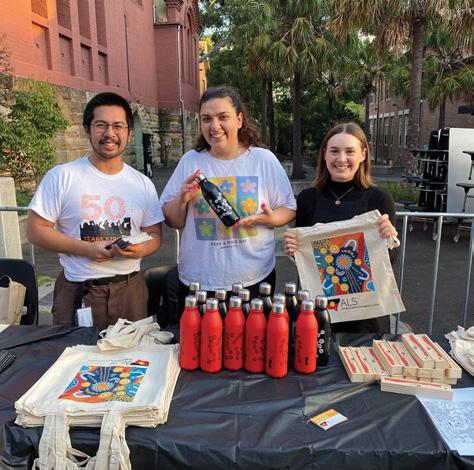
ALS team members at Deadly Nights, a 2023 Youth Week event held at Redfern’s National Centre of Indigenous Excellence.
29
Early support for kids and families
The Legal Assistance for Families Partnership Agreement (LAFPA) is a collaborative partnership between the ALS, Legal Aid and DCJ.
Based on an understanding that children can be kept safe at home with their families through the provision of early legal support, the agreement means Aboriginal families will be referred for legal advice at their first point of contact with the child protection system.
LAFPA comes from Family Is Culture recommendation 53: “The Department of Communities and Justice should update its policies and procedures to ensure that all Aboriginal families receive ‘warm’ referrals to legal advisors, with a preference for Aboriginal services, before child protection involvement escalates to the point where entry into care is considered a possibility.”
Pilots commenced in the Hunter Central Coast District and Tamworth Community Services Centre in February 2023. A project review, including stakeholder focus group, provided insights leading to an improved implementation plan. It is anticipated that LAFPA will be rolled out state-wide in 2023–24.
Family Law Practice
Our Family Law Practice focuses on keeping families safe and empowered through the provision of early legal advice and options, particularly where there are child protection concerns.
We promote family law as an alternative protective pathway to the DCJ child protection system one that affords families more agency and leads to better outcomes for kids. Our teams pride themselves on their knowledge of the intersections between the family law and care and protection jurisdictions, which means we can provide opportunities for our clients to access family-led resolution options to parenting issues.
We primarily provide representation within the Specialist Indigenous List of the Federal Circuit and Family Court of Australia in Sydney. We now also have a presence in Lismore and Coffs Harbour, with the commencement of the Specialist Indigenous List operating from both locations in February 2023.
The point of difference within the Specialist Indigenous List is that an Indigenous Family Liaison Officer is based within the court, helping families to understand and engage with court processes and connect to legal and other support services. The ALS has a strong relationship with the Indigenous Family Liaison Officer, which helps to facilitate culturally appropriate wraparound supports for our clients.
The ALS joined a march coordinated by AbSec on 13 February 2023 to mark the 15th anniversary of the Apology to the Stolen Generations.
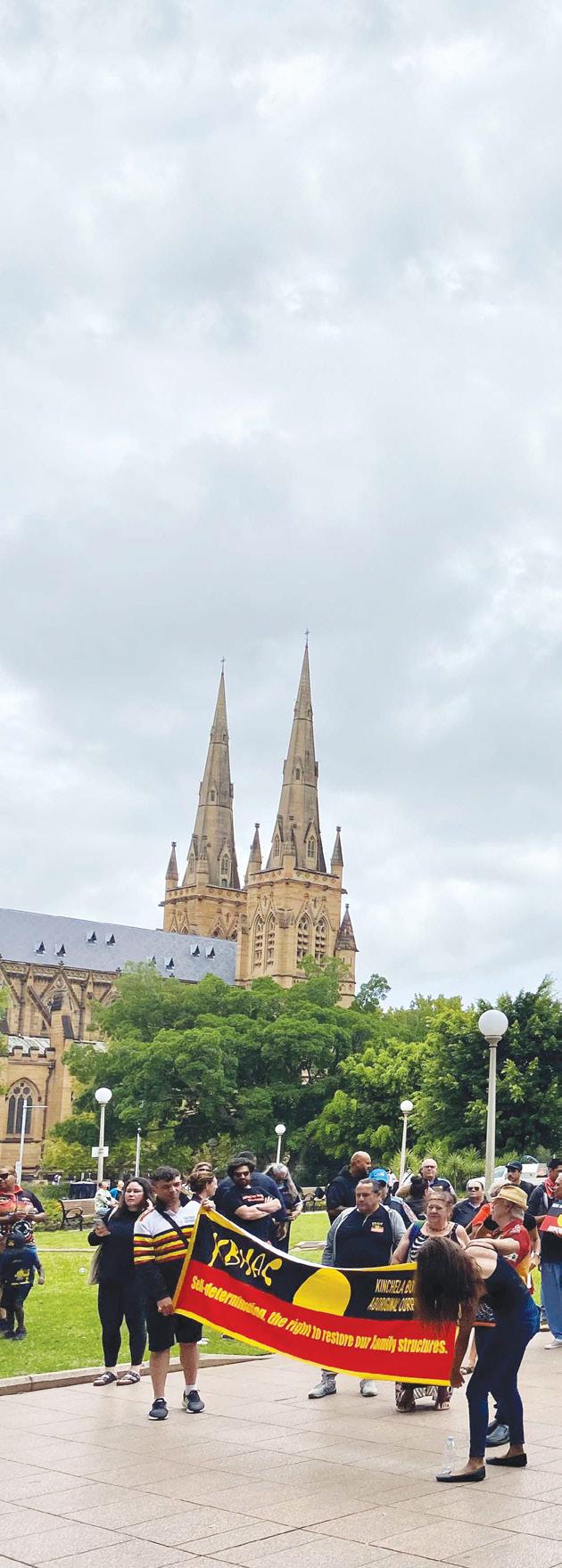
30
ACT Care and Protection Legal Assistance Service
We were very pleased to establish a new service this year for Aboriginal families in the ACT who are at risk of having their children removed from their care, or whose children have already been taken.
The ALS Care and Protection Legal Assistance Service provides legal advice, representation and referral for Aboriginal families dealing with Child and Youth Protection Services (CYPS), with pathways established to ensure families receive legal advice as soon as they begin to engage with the agency. This service fills a significant gap that previously existed in the system. Its implementation is part of the ongoing response to the Our Booris, Our Way review into the over-representation of Aboriginal and Torres Strait Islander children in
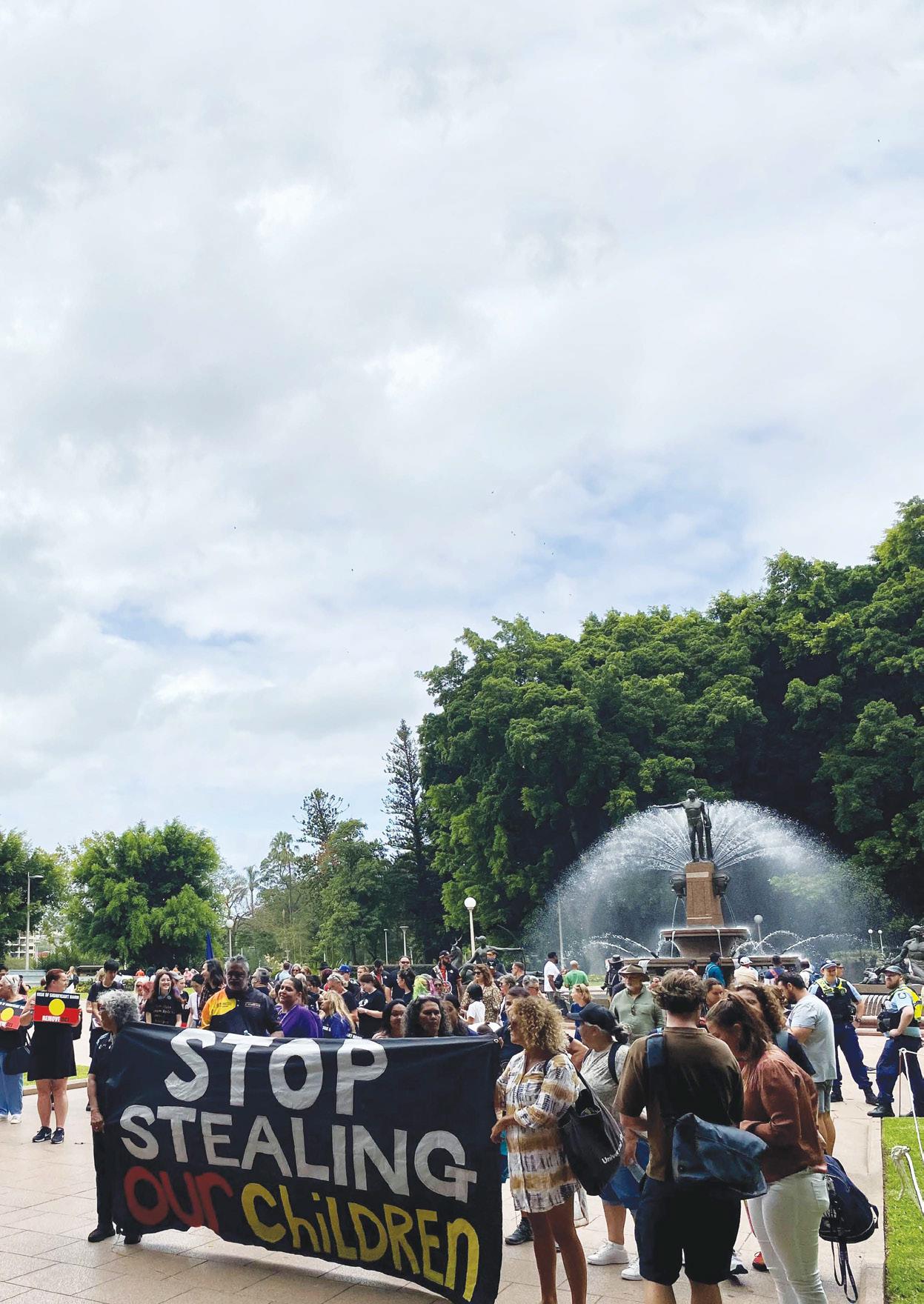
the child protection system in the ACT. Our Booris, Our Way was co-designed and led by Aboriginal and Torres Strait Islander people, serving as a key national example of practical self-determination. The final report was presented to the ACT Government in December 2019, delivering 29 recommendations and eight subrecommendations to reduce the number of Aboriginal and Torres Strait Islander children in out-of-home care, ensure children remain connected to community and culture, and support parents and families to safely care for their children.
We look forward to growing this nascent service and supporting more families in 2023–24.
31
Family violence and safety
The ALS introduced two new programs in 2022–23 to promote safety and wellbeing for Aboriginal and Torres Strait Islander people experiencing domestic, family and/or sexual violence.
123 clients and families supported
Family Violence Prevention Unit
The ALS Family Violence Prevention Unit (FVPU) was launched in July 2022, offering free and holistic support for Aboriginal and Torres Strait Islander people on the NSW South Coast and in the ACT.
This service addresses both legal and nonlegal needs for victims and survivors of family, domestic and sexual violence and assault, while facilitating wrap-around support for a wide range of concerns such as parenting, housing, finances, and more.
Collaboration with local Aboriginal communities and community-controlled services is critical to the authenticity of the model. For example, in Nowra, the ALS works collaboratively with an Indigenous case worker from the South Coast Women’s Health and Welfare Aboriginal Corporation (Waminda).
Community outreach was a major priority in 2022–23 as we worked to launch the FVPU, raise awareness of the help we can provide, and establish trust and connections. We built upon an existing outreach circuit (established through previous collaborative work as part of the 2019 bushfire recovery project) consisting of a monthly outreach clinic at the South Coast AMS and Bomaderry Community Centre, and at locations in Wreck Bay, Ulladulla, Batemans Bay, Wallaga Lake, Moruya, Bega and Eden. In the ACT, we run weekly outreach clinics at the Jerrabomberra Wetlands Women’s Group and
590+ services provided
the YWCA. Throughout the financial year, we conducted 62 outreach clinics with 142 clients attending.
We additionally ran 15 early intervention activities at the Eden Women’s Group, Thrive Together Homelessness Festival, the Alexander Maconochie Centre, and other events and locations. In late 2022 the Koori Knockout was held in Nowra, providing a significant opportunity to yarn with community and network with organisations that we rarely see on the South Coast.
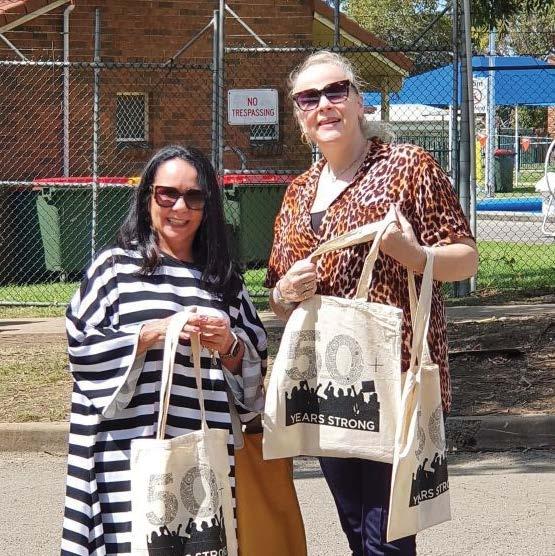
An ALS solicitor with Minister for Indigenous Australians, Linda Burney at the 2022 Koori Knockout.
32
Legal Assistance for Women
We introduced the Legal Assistance for Women program to the Hunter, Newcastle and Lake Macquarie region in January 2023. This service offers culturally safe, wrap-around support for Aboriginal women and children who have experienced or are at risk of experiencing domestic, sexual and/or family violence.
Like the Family Violence Prevention Unit, this service represents a shift in how the ALS supports our communities by providing holistic support within a multidisciplinary team. We respond to both the legal and non-legal needs of women and children who may otherwise feel lost and unsupported in a cycle of referrals, dealing with a long list of services who don’t communicate with each other. We are seeking to fill a critical gap which has historically seen women able to get help for discrete needs but unable to receive long-term, wrap-around support for other critical concerns including housing (which is one of the most prominent needs of our clients), ADVO applications, family law matters, child protection and custody matters, and victims’ support.
Our new Legal Assistance for Women office in Newcastle is designed as a safe, welcoming space for Aboriginal women and children. In conducting community outreach, the team has sought to prioritise areas with the highest demand and least services available for Aboriginal and Torres Strait Islander women and children experiencing domestic and family violence. In particular, we have built a strong relationship with Wahroonga Aboriginal Corporation based in Raymond Terrace. In 2023–24, we hope to increase outreach to the Scone, Singleton and Cessnock region, with anecdotal evidence suggesting this area is poorly serviced despite comparatively high domestic violence rates.
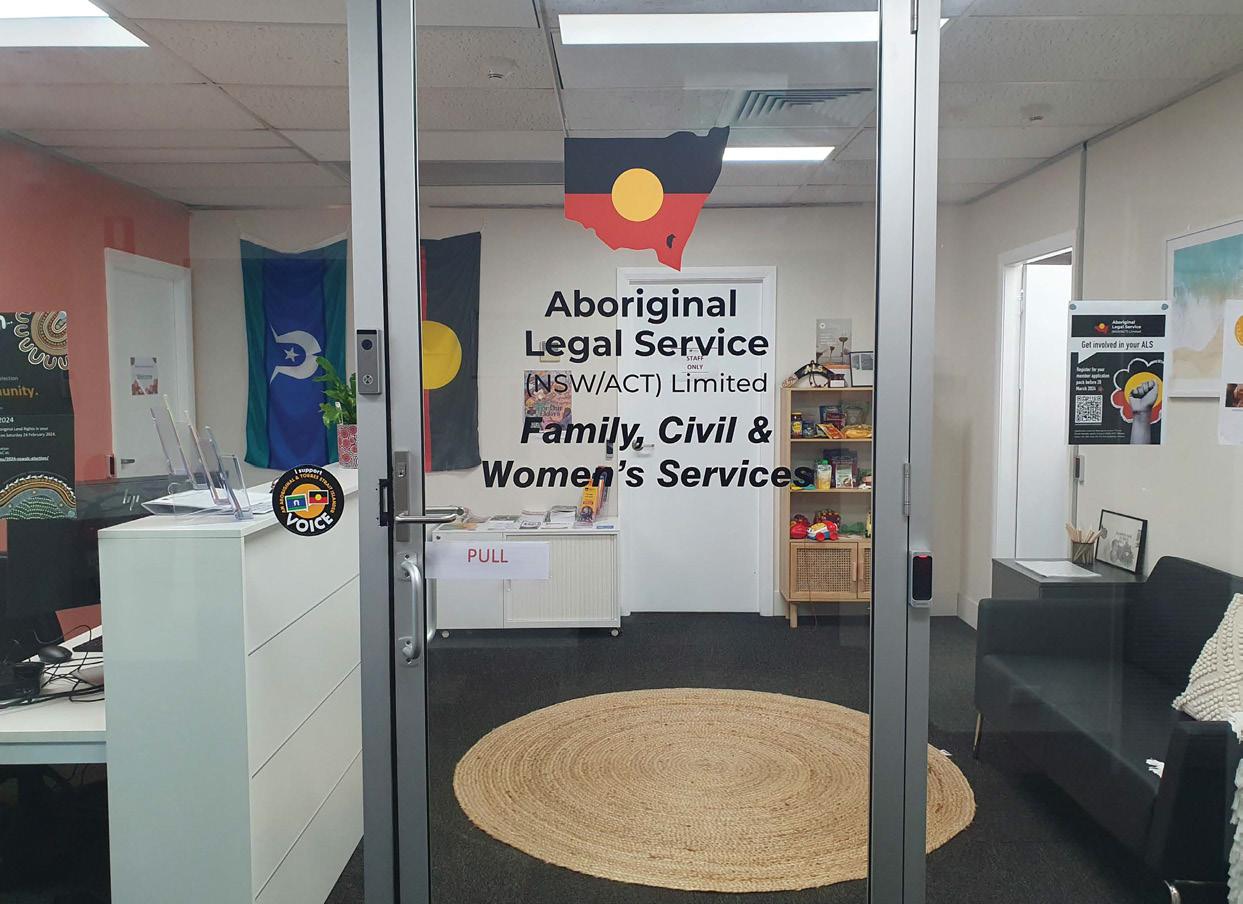
33
ALS Fines Clinic
Social justice programs
Your Story
Disability Legal Support
Fighting back against fines
The ALS began providing legal assistance with fines in 2021 in response to community concern about COVID-19 fines and policing, and the high risk that fines could lead to further entrenchment in the quicksand of the criminal legal system.
While the ALS Fines Clinic was initially funded by a 12-month grant from NSW Aboriginal Affairs, we have been able to continue providing this service thanks to our generous and committed community donors.
In 2022–23, we assisted 366 adults and young people across NSW to resolve 2,207 individual fines. Through legal advocacy and supporting our clients to access options for financial hardship, we helped Aboriginal communities to manage well over $800,000 of fine debt.
In addition to directly supporting individuals with fines, we delivered community legal education and outreach for communities in the Central West, Far West, South Coast, Central Coast, Greater Western Sydney and Sydney metro regions. Through these face-to-face initiatives and consistent messaging on social media, we raised awareness of the options available to people receiving fines and the risks of ignoring a fine or electing to fight it in court without legal advice.
This casework and community legal education was complemented by advocacy in the courts, in the media, and direct to government and departmental agencies to fight for a fairer fines system for Aboriginal communities and the people of NSW. We were quick to commend
Greater Sydney Aboriginal Tenants Service
Western Aboriginal Tenants Advice and Advocacy Service
Revenue NSW for its decision to withdraw 33,000 COVID fines in November 2022, after the NSW Government conceded in the Supreme Court that some fines were invalid. We have been unwavering since then in calling for all remaining COVID fines to be cancelled.
“We know COVID fines had an unfair and unequal impact on Aboriginal people,” said ALS CEO Karly Warner. “Aboriginal people have lost their driver’s licences as a result of unpaid COVID fines which has flow-on effects in being unable to get to work, take kids to school, shop for groceries, or go to health appointments. Community have been forced onto payment plans they can’t afford.”
Through a partnership with the ‘Dealing with Fines’ program run by the Dharriwaa Elders Group (DEG) in Walgett, the ALS Fines Clinic also contributed to capacity-building in a local Aboriginal community-controlled organisation. ALS staff supported the establishment of mutual referral pathways, drop-in clinics with in-person and telephone legal advice from the ALS, and training for DEG staff to support their community members with fines.
This partnership demonstrates a highly localised, culturally safe and community-determined model for collaborative service provision which has the potential to be replicated in other locations. As a result of this partnership, DEG supported 85 clients to access legal advice from the ALS during the reporting period, leading to the resolution of almost $190,000 of fine debt in Walgett.
34

ALS team members provided advice and referrals for people with fines at the Carriageworks NAIDOC Family Fun Day.
35
Elevating the voices of people with disability
Your Story Disability Legal Support is a partnership between National Aboriginal and Torres Strait Islander Legal Services (our national peak body) and National Legal Aid.
This service provides information, advice and support to people wishing to engage with the Royal Commission into Violence, Abuse, Neglect and Exploitation of People with Disability.
Since 2019, the ALS had allocated solicitors to provide this service for Aboriginal and Torres Strait Islander people in NSW and the ACT. As submissions to the Royal Commission closed on 31 December 2022, our work during this financial year was focused on a final push to get the word out and support any remaining community members who wished to share their story before the closing date.
Our solicitors visited 11 prisons and juvenile justice centres, promoting this opportunity to people behind bars so that their stories could be heard and we were successful in setting up access to a free-call number in NSW prisons.
We also reached out to people with disability living in the community, attending events and visiting local services in Grafton, Tamworth, Armidale, Coffs Harbour, Port Macquarie, Taree, Broken Hill, Newcastle, Canberra and Sydney.
We are proud of our contribution to this important Royal Commission and hope it will lead to real changes for people with disability. We continue to work with many of our Your Story clients, assisting them with other legal matters and continuing to build strong relationships with their communities.
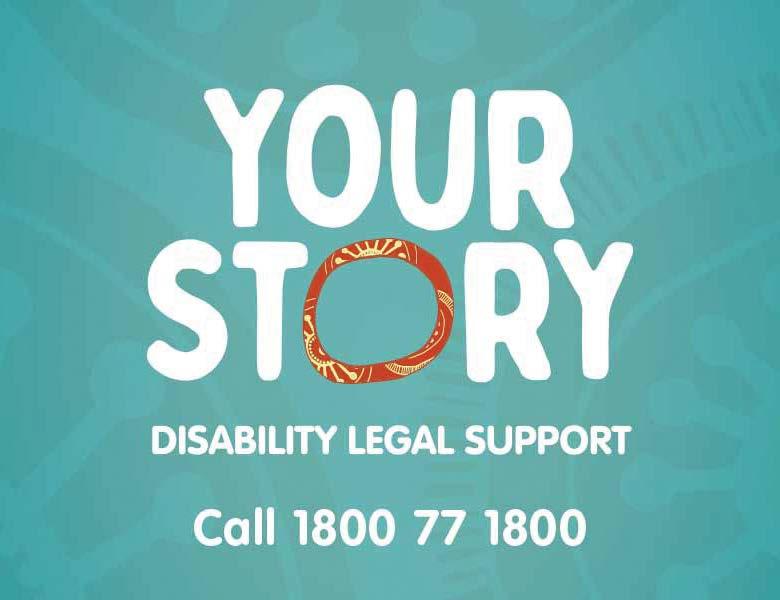
Highlights of 2022-23
The ALS Your Story team supported:
54 clients to make Royal Commission submissions
~10
girls and boys to make a group submission from a juvenile justice centre
12 clients to share their story in private Royal Commission sessions
36
Tenants’ advice and advocacy
The ALS auspices the Greater Sydney Aboriginal Tenants Service (GSATS), an organisation advocating for the rights of Aboriginal and Torres Strait Islander renters in public, social and private housing.
This financial year we also concluded our auspice of the Western Aboriginal Tenants Advice and Advocacy Service (WATAAS), coordinating a smooth transition to new management under Murra Mia Tenant Advice and Advocacy Service from 1 July 2023.
It was an honour to provide this important service for community for the past seven years, helping many families to find a safe, comfortable home and stay there. We are proud of the impact that our many WATAAS team members have made over the years and thank them for their service.
GSATS WATAAS
Worked on 351 cases in 2022-23
Helped people avoid homelessness in 109 cases and prevent eviction in 53 cases
81% of clients said they had an improved understanding of tenancy law after working with GSATS
Worked on 260 cases in 2022-23
Helped people avoid homelessness in 61 cases and prevent eviction in 42 cases
67% of clients said they had an improved understanding of tenancy law after working with WATAAS
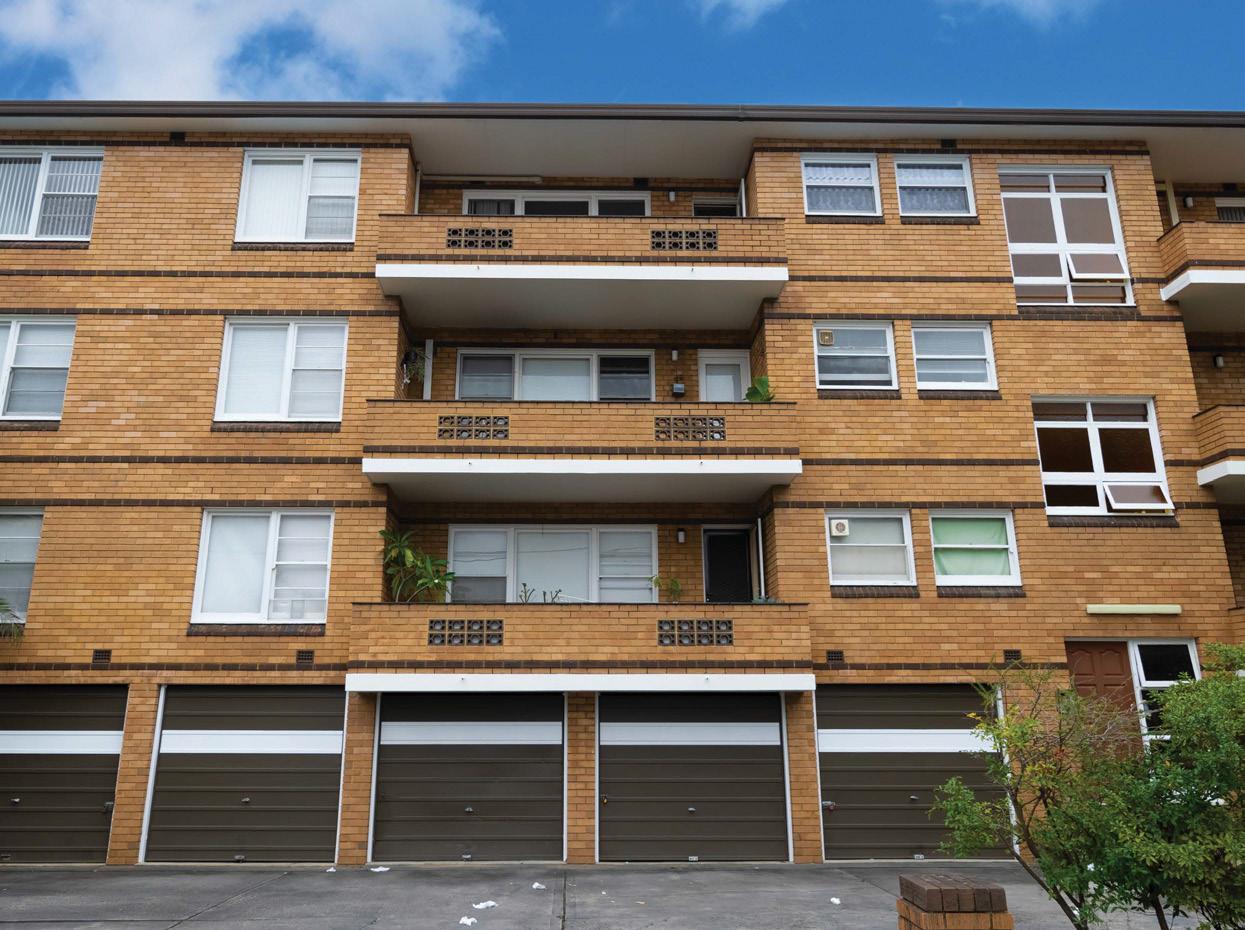
37
Advocating for justice and achieving community-led change
Driving systems change through policy reform, justice projects and sector strengthening
Closing the Gap
The National Agreement on Closing the Gap seeks to improve Aboriginal people’s lives and tackle entrenched inequalities. The ALS is proud to work towards Closing the Gap, both through our everyday work and as a formal partner in the Closing the Gap process in NSW.
Our involvement focuses on implementing the Closing the Gap Priority Reforms and achieving socioeconomic targets 10, 11, 12 and 13.
NSW Aboriginal Justice Partnership
The NSW Aboriginal Justice Partnership is a collaboration between our communities and the NSW Government to close the gap. It aims to deliver structural change across the legal system by sharing decision-making, strengthening the community-controlled sector, addressing systemic racism and improving accountability and the development of local community justice plans.
Target 10
Reducing adult imprisonment
By 2031, reduce the rate of Aboriginal and Torres Strait Islander adults held in incarceration by at least 15 per cent.
The ALS is working in partnership with our NSW CAPO colleagues and DCJ to co-design and deliver a number of projects guided by local needs and priorities which aim to reduce adult incarceration in NSW, including the disproportionate representation of Aboriginal people on remand.
Project development commenced on the Bail Advocacy Program for Women, with implementation to occur in 2023–24. The program aims to support Aboriginal women, non-binary and gender diverse people to
This collaboration established the Aboriginal Justice Partnership Committee (AJPC) in 2022, as the key decision-making group providing strategic oversight of Closing the Gap reforms across the NSW law and justice sector. The AJPC is co-chaired by ALS CEO Karly Warner, as the peak justice representative and NSW Coalition of Aboriginal Peak Organisations (NSW CAPO) lead for justice targets, as well as Brendan Thomas, Deputy Secretary of the NSW Department of Communities and Justice (DCJ).
The AJPC oversees the progress of eight working groups in leading the work required for Closing the Gap targets 10, 11 and 13, as well as the priority reforms.
This state-based work is also supported by the national Justice Policy Partnership, the first of five policy partnerships to be established under the National Agreement on Closing the Gap.
access bail and engage with referrals for holistic wraparound support to reduce risk of breaches of bail and future contact with the criminal process.
The ALS co-chairs several Target 10 officerlevel working groups in partnership with DCJ, which will oversee and direct the implementation of the Bail Advocacy Program for Women, the Aboriginal Throughcare Strategy and other key initiatives aimed at transforming the legal system, increasing community participation in legal decision-making, and increasing diversionary pathways to break cycles of contact with the criminal legal system.
38
Target 11
Reducing children’s imprisonment
By 2031, reduce the rate of Aboriginal and Torres Strait Islander young people (10-17 years) in detention by at least 30 per cent.
The ALS co-chairs the active Target 11 Working Group alongside the Youth Justice division of DCJ. The working group has convened approximately every eight weeks since commencement in February 2023 and comprises a range of stakeholders including the NSW Children’s Court, NSW Police, Justice Health, Transforming Aboriginal Outcomes, the Bureau of Crime Statistics and Research, Education, Legal Aid and the Advocate for Children and Young People.
The working group has established subcommittees where work has commenced on a range of items, including increasing diversions from police and courts for Aboriginal young people; increasing mental health dismissals; developing a model for community-controlled, family-inclusive residential alternatives to custody; and enhancing contact and support between incarcerated young people and their incarcerated parents.
The working group also oversees a range of programs, including the new ALS Bail Advocacy Program (Youth) and two shortterm remand pilot programs in South Sydney and Wagga Wagga.
Target 12
Reducing the number of children in out-of-home care
By 2031, reduce the rate of overrepresentation of Aboriginal and Torres Strait Islander children in out-of-home care by 45 per cent.
The 2019 Family Is Culture (FIC) report and its 126 recommendations provide a roadmap to reforming the child protection system to better support our kids, families, and communities, and to reduce the overrepresentation of Aboriginal and Torres Strait Islander children in out-of-home care (Closing the Gap Target 12).
Since this landmark report’s publication, the ALS has been working in partnership with AbSec – NSW Child, Family and Community Peak Aboriginal Corporation; the Jumbunna Institute for Indigenous Education and Research; and the Public Interest Advocacy Centre (PIAC) to hold government accountable to these critical reforms.
In October 2022, AbSec and the ALS jointly held a sector forum, closely followed by the publication of an annual report (together with Jumbunna and PIAC) monitoring
the NSW Government’s progress in FIC implementation. In November 2022, we acknowledged the passage of the Government’s Children and Young Persons (Care and Protection) Amendment (Family is Culture) Bill, which outlined implementation of 13 of the 25 legislative reforms recommended by FIC. In late 2022, with just a few months remaining until the state election, we penned an open letter noting that the Bill “represents some improvement, [but] this is just one small step down a long road of reform”. More than 50 community organisations signed onto the letter, urging the next NSW Parliament to “do the right thing for Aboriginal children and reform a child protection system that has been shown to actively harm them, by taking urgent action to fully implement the Family Is Culture recommendations in genuine partnership with AbSec, the Aboriginal Legal Service, and Aboriginal communities”.
We will continue to advocate on this issue and its critical importance for Closing the Gap in NSW.
39
Target 13
Reducing violence against women and children
By 2031, the rate of all forms of family violence and abuse against Aboriginal and Torres Strait Islander women and children is reduced by at least 50%, as progress towards zero.
The ALS co-chairs the Target 13 Officer Level Working Group alongside DCJ. This critical work involves collaboration with a wide range of stakeholders to develop the first domestic, family and sexual violence action plan specifically tailored for Aboriginal communities in NSW.
As part of this work, the ALS and DCJ identified a need for the voices of Aboriginal women to be centred in these conversations to inform and drive decision-making. This resulted in the establishment of the Aboriginal
Women’s Advisory Network (AWAN) in July 2022. The network is tasked with providing knowledge and guidance to the Target 13 Working Group, contributing to Aboriginalled and placed-based solutions to address domestic, family and sexual violence.
The ALS successfully secured funding for secretariat support to get AWAN off the ground, including employment of five secretariat staff. The development of AWAN has been informed by sector stakeholder meetings with organisations including Wirringa Baiya Aboriginal Women’s Legal Service, the Women’s Legal Service NSW, Women’s Domestic Violence Court Advocacy Program, Guthrie House, and our partners in the NSW Coalition of Aboriginal Peak Organisations.
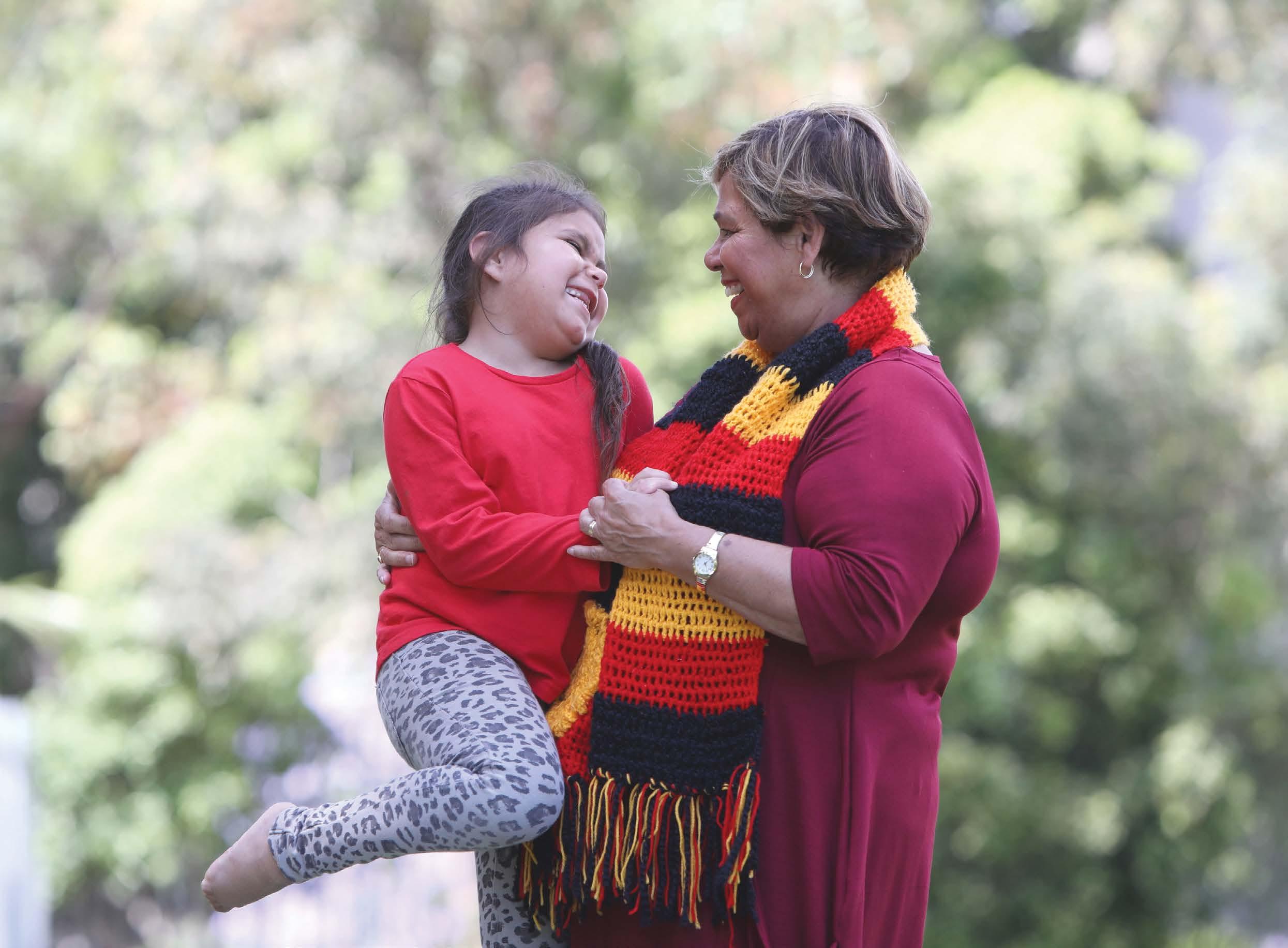
40
Further advocacy priorities
Raising the age of criminal responsibility
The ALS has continued to advocate for raising the minimum age of criminal responsibility to at least 14 years old. We play an active role in the national Raise The Age campaign and we are a key member of the regional NSW and ACT campaigns.
This year, the ALS helped advocate for a revitalised campaign in NSW through the creation of a new Campaign Director position in partnership with the Public Interest Advocacy Centre. This campaign will launch in October 2023 and includes new partnerships clustered around a lead group, which includes the ALS.
In June 2023, we made a submission on changes to the ACT’s Justice (Age of Criminal Responsibility) Legislation Amendment Bill 2023, including providing protections for children under 10 and protections against the adverse use of therapeutic interventions in subsequent criminal proceedings.
Supporting constitutional recognition and the Voice to Parliament
Following on from our organisational support of the Uluru Statement from the Heart, the ALS Board voted unanimously to support and advocate in favour of the Voice to Parliament and constitutional recognition of Aboriginal and Torres Strait Islander peoples.
In June 2023, we released a statement affirming our support. This was followed by further advocacy efforts beyond the reporting period.
“As a service that is on the absolute front line of First Nations disadvantage, we are uniquely placed to appreciate the inability of government to understand and consistently operate in a way that embraces and promotes our selfdetermination.
True self-determination means we design, develop and deliver the services through our structures and organisations. It means government and the community respects our entitlements to speak and act for ourselves.”
Aunty Lorraine Wright, Wiradjuri Elder and Deputy Chair of the ALS, speaking in support of the Voice and constitutional recognition.
Giving expert advice to reviews and inquiries
Over the financial year, we provided advice and recommendations to multiple parliamentary inquiries, legislative reviews, and policy consultations. Some of these included:
1. Submission to Statutory Review of Victims Rights and Support Act 2013
2. Submission to Inquiry into access to services and information in AUSLAN
3. Submission on Draft Exposure Crimes Legislation Amendment (Coercive Control) Bill 2022
4. Submission to the Bail Act Review: Show Cause – Firearms Offences and Criminal Associations
5. Submissions to and evidence in public hearings for Law Enforcement Conduct Commission investigation Operation Mantus
6. Submission to the Inquiry into Missing and Murdered Aboriginal Women and Children
7. Comments on Draft Corrections and Sentencing Legislation Amendment Bill
8. Submission to Justice (Age of Criminal Responsibility) Legislation Amendment Bill 2023
9. Submission on Family Law Amendment Bill (2023) Cth
10. Preliminary Submission on Review of Serious Road Crimes 2023
11. Submission on Supreme Court Amendment Bill (Wrongful Convictions)
12. Submission on Safe Places Emergency Accommodation Program Inclusion Round
13. Submission to the Inquiry into Current and Proposed Sexual Consent Laws in Australia
14. Preliminary Submission on Sentencing of Firearms, Knives and other Weapons Offences in NSW
15. Submission on National Justice Reinvestment Program Grants and Unit
16. Submission to public consultation on the Administrative Review Reform Issues Paper
17. Submission on Family Law Amendment Bill (2023)
41
Supporting families through coronial inquests
The ALS provides legal representation and advice for Aboriginal families who have lost loved ones in custody or police operations, supporting them through the coronial inquest process.
Demand for this service continued to rise steeply in 2022–23, with our Coronial Unit involved in 37 cases over the course of the year. This is a 32% increase on last year’s record caseload. It is distressing to see the ongoing frequency of Aboriginal deaths in custody, over three decades since the royal commission that was meant to address this issue.
At their best, coronial inquests can be a means for bereaved families and communities to seek answers about their loved one’s death, advocate for change, and be heard. Yet the many unresolved recommendations from the 1992 Royal Commission and ongoing lack of accountability for deaths in custody have led to understandable disillusionment for many of our clients and communities.
This year we continued to call for the Coroner’s Court to be strengthened into a safer place for our clients and a legal institution with the power to prevent future deaths in custody, through examining systemic issues and ensuring accountability for reforms.
In June 2023, the Commonwealth Government launched a digital dashboard providing real-time monitoring of deaths in custody across Australia, including Indigenous deaths in custody. We welcomed the increased transparency this brought to the issue while calling for more substantive changes focused not just on monitoring deaths, but preventing them.
“There is much more that governments can do to stop deaths in custody, from implementing the remaining Royal Commission recommendations to ensuring Aboriginal and Torres Strait Islander Legal Services are adequately funded to keep our people out of prison wherever possible,” said ALS CEO, Karly Warner.
42
CASE STUDY
Case study: Coronial inquest into the death of Stanley Russell
Stanley Russell died on the floor of his aunt’s house after being shot multiple times by police. He was 45 years old. As a son, father, partner, grandfather, brother, nephew, uncle and friend, he left many loved ones behind in mourning.
A coronial inquest into Stanley’s death was held in November 2022. The ALS represented his partner, Vickey Fernando.
On the day Stanley died, police were attending his aunt’s house to execute a bench warrant calling for his arrest. The inquest heard about several missed opportunities to safely arrest Stanley. The inquest heard that officers shot Stanley after he brandished an axe and a Bowie knife.
The Coroner made several recommendations to prevent similar incidents in the future. We particularly welcomed a recommendation for the ALS and NSW Police to consider developing a joint procedure for encouraging Aboriginal defendants to voluntarily hand themselves in when wanted on bench warrants.
After the inquest concluded, our client Vickey Fernando called on NSW Police to work with the ALS to make this reform a reality, and we echoed her sentiments.
The ALS coordinated media coverage for the inquest findings. A journalist films an ALS staff member (middle right) speaking on behalf of Stanley’s partner, Vickey Fernando (middle left).
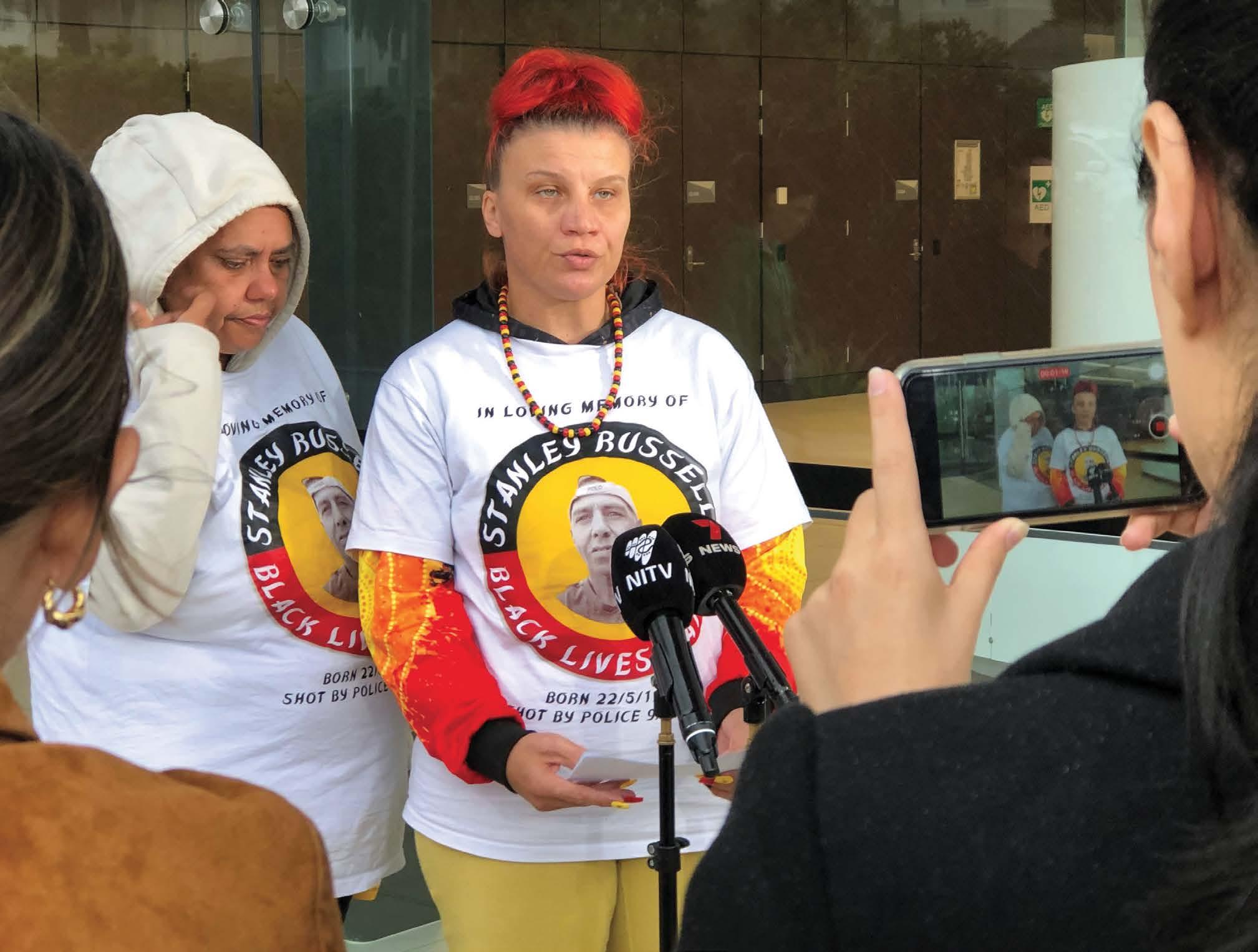
43
Laying strong future foundations
Funding our work
Funding under the National Legal Assistance Partnership
The majority of ALS funding is through the National Legal Assistance Partnership (NLAP), funded by the Australian Government and administered by the NSW Government and ACT Government.
The current agreement provides funding until 30 June 2025.
The NLAP agreement funds our core legal services in criminal law, care and protection and family law, together with new funding for the following programs that expand our impact:
• Justice Policy Partnership - to increase our data capability and capacity to participate in this Closing the Gap initiative;
• Coronial inquiries and expensive and complex cases - for the provision of legal assistance to families of deceased Aboriginal and Torres Strait Islander individuals in coronial inquiries, and the provision of legal assistance to Aboriginal and Torres Strait Islander clients involved in complex and/or expensive cases;
• Supporting people with mental health conditions to access the justice systemfunding for the Mental Health Advocacy and Referral Unit to provide advocacy and referrals for Aboriginal clients with mental health conditions who are in contact with the criminal justice system;
• Legal assistance for vulnerable womenfunding for the delivery of a dedicated legal assistance service to women, with a focus on women experiencing, or at risk of, family violence.
Other government and private funding
The ALS receives funding from other sources for a range of key legal service and support programs including:
• Funding from the NSW Government through the Department of Communities and Justice to support:
• the Visiting Legal Service and Youth Bail Advocacy Program;
• ALS work at the Youth Koori Courts in Surry Hills, Parramatta and Dubbo; and
• the following Closing the Gap programs:
• Aboriginal Children & Families Advocacy Program
• Bail Advocacy Program
• NSW Aboriginal Justice Partnership
• Aboriginal Throughcare Strategy
• Therapeutic Pathways for Children
• Funding from the NSW Government through the NSW Department of Premier and Cabinet (and auspiced via the NSW Aboriginal Land Council to allocate funding to members of the NSW Coalition of Aboriginal Peak Organisations) for work that includes the ALS’ involvement in Closing the Gap meetings and working groups;
• Funding from the NSW Government through the Department of Fair Trading to support the activities of the Western Aboriginal Tenants Advice and Advocacy Service (WATAAS) and Greater Sydney Aboriginal Tenants Service (GSATS);
• ACT Government funding for the following programs: Ngurrambai Bail Support, Front-Up, Duty Lawyer, Frontline Service Delivery and new in 2022–2023, the Care & Protection Legal Advocacy Service;
44
• Funding from Legal Aid NSW for ALS participation in the Early Appropriate Guilty Plea scheme; care and protection services in regional locations; and the Cooperative Legal Service Delivery program;
• Commonwealth funding though the National Indigenous Australians Agency for our Custody Notification Service and the Family Violence Legal Service Program based in Nowra and Canberra;
• Funding from the Paul Ramsay Foundation allowing the ALS to auspice the grant for the Bugmy Bar Book Committee, and to support the ALS Justice Reinvestment program; and
• Funding from the Dharriwaa Elders Group to provide a staff member to assist with the Walgett Wellbeing Collaboration
Fundraising
In 2022–23, the ALS received record donations totalling over $3.9 million.
We are deeply grateful to the many individual community supporters and businesses who contribute to our work, including over 1,100 people who donate monthly to the ALS. This year’s record fundraising total was also made possible by the outstanding support of one very generous philanthropic donor.
These donations provide much-needed support for initiatives that are not backed by ongoing funding, including our Fines Clinic and social justice advocacy, and for programs that do not receive enough formal funding without additional support.
Join the fight for justice with a monthly donation: www.alsnswact.org.au/monthly
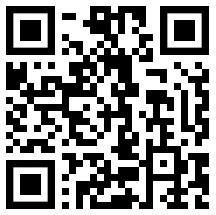
Thank you to every individual, business, foundation and government agency that funded our work in 2022–23.
45
Defending our communities’ right to culturally safe legal support
In the lead up to the May 2023 Federal Budget, Aboriginal and Torres Strait Islander Legal Services (ATSILS) across Australia called for a joint $250 million emergency support package to avoid freezing services in areas of acute need.
The ALS was proud to coordinate this campaign on behalf of all seven ATSILS across the country, with our CEO (and Chair of NATSILS National Aboriginal and Torres Strait Islander Legal Services) Karly Warner acting as primary spokesperson.
On 3 May, we held an online town hall meeting attended by more than 350 people across the country. While Attorney-General Mark Dreyfus was unable to attend, he provided a statement for public distribution at the meeting asserting his “emphatic” support for the role of ATSILS in providing accessible, culturally appropriate services, and recognising that our funding must match the high demand for services.
Also on 3 May, we launched an online petition calling on the Attorney-General to provide an emergency funding package for ATSILS, collecting almost 1,800 signatures.
The Budget delivered on 9 May contained no additional funding for ATSILS. Shortly after the Budget was delivered, we welcomed a Federal Government announcement of a $21 million funding increase. While the funds meant different things for various ATSILS services around the country, for the ALS it was not enough to reverse freezes to our criminal law services in 13 Local Courts, which went ahead from 15 May.
“It’s a really good start and will help us keep the lights on over the next 12 months, but it’s simply not enough,” Karly Warner said.
We will continue to advocate to both state and federal governments in 2023–24 for funding increases. A key part of this advocacy will be our submission to the independent review into the National Legal Assistance Partnership. The review is due to be completed and released in 2024 prior to the current agreement’s expiry in 2025.
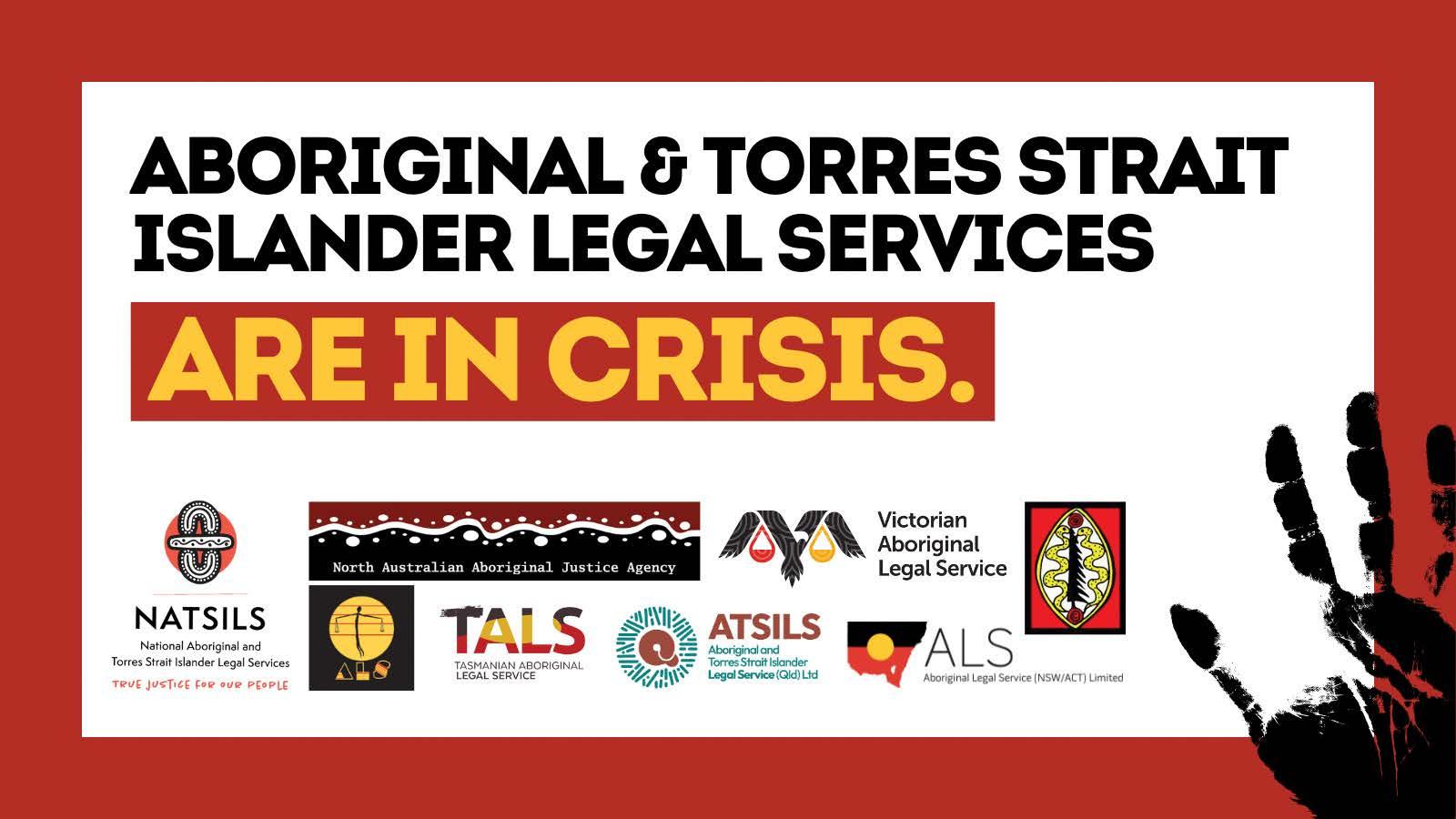
46
Supporting our staff and services to maximise their impact
This financial year saw a significant expansion of services and the establishment of a new practice area following the onboarding of a number of new grant-funded programs.
This has not only positively impacted our clients and community, but also ALS staff, affording team members an opportunity to move into new roles and grow professionally in doing so.
We established a new Justice Projects, Policy and Practice team, operating alongside our pre-existing practice areas in criminal law and care and protection/family law. This practice area has overseen the beginning of the ALS justice reinvestment program in Mt Druitt, Bourke and Moree, plus the introduction of a team to support community engagement and the development of the NSW Aboriginal Justice Partnership for Closing the Gap. New staff have joined existing ALS practice team members in many locations. The creation of non-legal social support positions, including social and mental health workers, has seen the ALS move into an exciting new era of providing holistic services for our communities.
The Criminal Law Practice welcomed team members for the Youth Bail Advocacy Program (based in Redfern & Parramatta), the Mental Health Advocacy and Referral Service (in Parramatta and Wagga Wagga) and the Visiting Legal Service for young people in detention; while the Care and Protection/Family Law Practice has seen additional staff employed for the Child and Family Advocacy and Support Service in Dubbo and Moree, family violence and safety services in Nowra, the ACT and the Hunter, and the introduction of care and protection services in the ACT.
Additional roles in supporting functions including finance and human resources have enabled this expansion. The role of Implementation Manager has been integral in coordinating the structural and operational change required to onboard new programs.
We are pleased to have finalised the set-up of two new offices in Newcastle and Nowra during the financial year, providing accessible and welcoming spaces for our family violence and
safety services to meet and support their clients. Following the conclusion of the ALS’ auspice of the Western Aboriginal Tenants Advice and Advocacy Service (WATAAS), this program’s office in Dubbo was closed on 30 June 2023 (with the service moving to an alternate nearby location under new management).
Our team at 30 June 2023
Employee Roles
Legal team
Legal team
Administration o cers and Paralegals
Field and engagement o cers
Shared services (supporting functions)
Auspiced tenancy services sta
Program managers and coordinators
Executive
Allied health and support workers
Administration officers and paralegals
Field and engagement officers
Shared services (supporting functions)
Auspiced tenancy services staff
Program managers and coordinators
Executive
Allied health and support workers
Aboriginality of employees
Non-Aboriginal employees
Aboriginal and Torres Strait Islander employees
Non-Aboriginal sta
Aboriginal and/or Torres Strait Islander sta
47
We are pleased to present an overview of the ALS financial performance and financial position for 30 June 2023.
General Purpose Financial Statements
Whilst the previous Financial Statements of the ALS have been prepared as Special Purpose Financial Statements, the 30 June 2023 Financial Statements have been prepared as General Purpose Financial Statements. The board has considered this basis of preparation as more appropriate for the ALS given the growth in size of the organisation in terms of funding, staff and operations.
Notes to financial statements
1. The financial statements on pages 49–50 include transactions from the following auspiced services: Greater Sydney Aboriginal Tenants Service (GSATS) and Western Aboriginal Tenants Advice and Advocacy Service (WATAAS), National Aboriginal and Torres Strait Islander Legal Services (NATSILS)
2. The Statement of Profit or Loss and other Comprehensive Income and Statement of Financial Position are an extract from the full Financial Report for the year ended 30 June 2023. The extracted Statements should be read in conjunction with the notes to financial statements. The full Financial Statements are available upon request.
3. The audited financial report for the year ended 30 June 2023 includes the first general purpose financial statements prepared in accordance with the Australian Accounting Standards Simplified Disclosures and AASB 1 First time adoption of Australian Accounting Standards has been applied. The ALS has adopted AASB 1060 General Purpose Financial Statements Simplified Disclosures for For-Profit and Not-for-Profit Tier 2 Entities. The ALS has adopted all of the new or amended Accounting Standards and Interpretations issued by the Australian Accounting Standards Board (‘AASB’) that are mandatory for the current reporting period. Special purpose financial statements have been prepared for previous annual reports.
48 Financials
49
For the year ended 30 June 2023 2023 $ 2022 $ Income Revenue from operations 32,742,39130,170,644 Donations & charitable funding 3,986,2471,795,354 Other income 561,465 71,649 37,290,10332,037,647 Expenses Employee expenses 24,296,29123,099,306 Professional expenses 1,519,1921,393,726 Occupancy expenses 975,464990,789 IT and telecommunications 1,328,8481,669,773 Administrative expenses 430,757488,484 Governance and finance expenses 239,052199,145 Travel and accommodation expenses 602,038308,821 Motor vehicle expenses 388,021327,737 Depreciation and loss on asset disposal 1,756,6821,714,657 Interest expense 248,783224,019 Other expenses 972,452655,893 32,757,58031,072,350 Surplus for the year 4,532,523965,297 Other comprehensive income -Total comprehensive income 4,532,523965,297
Statement of profit or loss and other comprehensive income
50 Statement of financial position As at 30 June 2023 2023 $ 2022 $ Assets Current Assets Cash and cash equivalents 18,019,5316,826,020 Receivables 535,326 411,586 Other financial assets 24,839,29115,775,473 Other current assets 603,609 532,262 Total Current Assets 43,997,75723,545,341 Non-Current Assets Property, plant and equipment 1,560,7211,588,556 Right of use assets 5,139,5336,069,969 Total Non-Current Assets 6,700,2547,658,525 Total Assets 50,698,01131,203,866 Liabilities Current Liabilities Payables and accruals 2,696,6211,741,580 Lease liabilities 4,303,6992,868,611 Provisions 4,080,2484,120,382 Contract liabilities 23,991,1779,180,450 Total Current Liabilities 35,071,74517,911,023 Non-Current Liabilities Lease liabilities 936,5493,154,434 Provisions 549,922 531,137 Total Non-Current Liabilities 1,486,4713,685,571 Total Liabilities 36,558,21621,596,594 Net Assets 14,139,7959,607,272 Funds Assets reserve 1,533,2281,533,228 Initial contribution for members 1,280,2711,280,271 Accumulated funds 11,326,2966,793,773 Total Funds 14,139,7959,607,272
 Sydney
Canberra
Bourke
Dubbo
Moree
Moruya
Sydney
Canberra
Bourke
Dubbo
Moree
Moruya
Broken Hill 51 Contact us 1800 765 767 www.alsnswact.org.au Find an ALS office near you www.alsnswact.org.au/locations @Aboriginal Legal Service @alsnswact @alsnswact
Lismore
52









































 Sydney
Canberra
Bourke
Dubbo
Moree
Moruya
Sydney
Canberra
Bourke
Dubbo
Moree
Moruya